Kristine Hughes's Blog, page 104
August 23, 2013
Victoria's Day One in London, Part One
After our two weeks in the Czech Republic and Germany last July, my husband Ed and I flew to London. I had been preparing for months to cram our days in England with a maximum of activity. But Ed was of another mind. He was limping on a very sore foot, and no matter what advice the Boots pharmacist gave us, the only way Hubby was comfortable was sitting down. Or prone on the mattress.
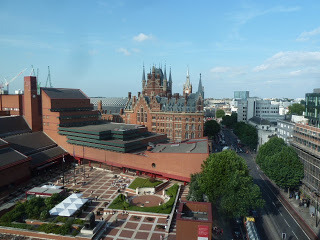
I was undeterred. We checked into our hotel, the Pullman London St. Pancras, 100 Euston Rd. On my various trips to London, I try to find hotels in different parts of the city, so I can get to know more of various neighborhoods. Until recently, the Pullman was part of the French chain, Novotel; it's had extensive renovation since its purchase by the Pullman chain. It is located immediately west of the British Library which is just west of the St. Pancras Hotel and Station, where the Eurostar operates. Above, looking east from our floor.
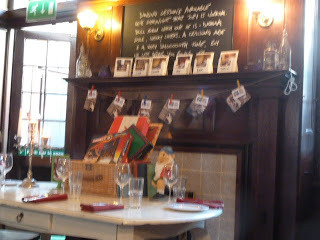 The little bistro where we had dinner featured a gnome on the table. LOL. Alongside the hotel, Charlton Street has an abundance of pubs, bistros and other small shops, many of which I suspect are under some threat from the extensive gentrification going on around there. Since the Eurostar moved to St. Pancras, the entire neighborhood has been upgrading, with all the positive and negative features of the process. Before leaving for Cambridge, we had one full day in London. In the morning, we started by taking the tube to Charing Cross station and waving our greetings to Charles I as he looks down Whitehall.
The little bistro where we had dinner featured a gnome on the table. LOL. Alongside the hotel, Charlton Street has an abundance of pubs, bistros and other small shops, many of which I suspect are under some threat from the extensive gentrification going on around there. Since the Eurostar moved to St. Pancras, the entire neighborhood has been upgrading, with all the positive and negative features of the process. Before leaving for Cambridge, we had one full day in London. In the morning, we started by taking the tube to Charing Cross station and waving our greetings to Charles I as he looks down Whitehall.
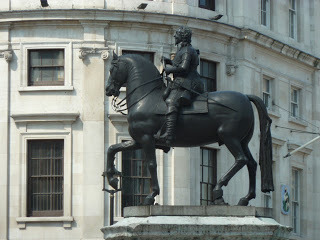 Charles I The bronze statue has an interesting history. Charles I (1600-49) took the throne of England after the death of the first Stuart King, his father James I, in 1625. Hubert Le Sueur, a French sculptor, cast the statue in 1648, but before it was erected, the Civil War broke out and Charles I was beheaded. The statue was sold for scrap, but the purchaser never broke it down, instead hiding it until after the Restoration in 1660 when Charles II was welcomed back as the new monarch. Charles II purchased the statue of his father and had it installed where it now stands, looking toward the site of his beheading in front of the Banqueting House, about halfway down Whitehall toward Parliament.
Charles I The bronze statue has an interesting history. Charles I (1600-49) took the throne of England after the death of the first Stuart King, his father James I, in 1625. Hubert Le Sueur, a French sculptor, cast the statue in 1648, but before it was erected, the Civil War broke out and Charles I was beheaded. The statue was sold for scrap, but the purchaser never broke it down, instead hiding it until after the Restoration in 1660 when Charles II was welcomed back as the new monarch. Charles II purchased the statue of his father and had it installed where it now stands, looking toward the site of his beheading in front of the Banqueting House, about halfway down Whitehall toward Parliament.
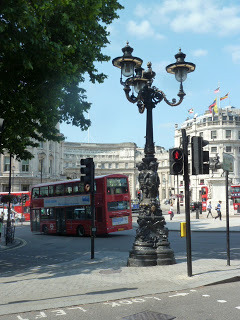 At the junction of The Strand and WhitehallCharles I is behind the traffic light at the right As Ed limped along, we made our way to Horse Guards. "We've been there before,:" he reminded me, as if I needed to be told. "Yes," I replied, thinking if you only knew how many times. "But we've never been to the Household Cavalry Museum." "Do they have places to sit down?" he said between clenched teeth. "Of course," I said, not really knowing if there was anything resembling a bench within 500 feet of the place.
At the junction of The Strand and WhitehallCharles I is behind the traffic light at the right As Ed limped along, we made our way to Horse Guards. "We've been there before,:" he reminded me, as if I needed to be told. "Yes," I replied, thinking if you only knew how many times. "But we've never been to the Household Cavalry Museum." "Do they have places to sit down?" he said between clenched teeth. "Of course," I said, not really knowing if there was anything resembling a bench within 500 feet of the place.
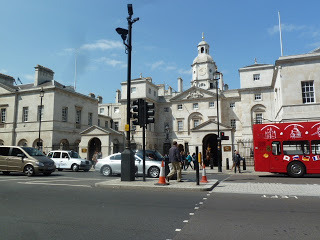 Horse Guards on Whitehall I tried to divert Ed from his painful left foot by pointing out the Palladian style of the building, completed in 1753 to the plans of William Kent. "Remember the Kent name," I said to Ed. "We'll run into him later in Norfolk." Ed looked skeptical. "I thought we were in Kent a couple of years ago. What do you mean, run into him?" "This time I mean William Kent, the 18th century architect, not the English county. And definitely nor the cigarette brand I remember from college." Ed shrugged.
Horse Guards on Whitehall I tried to divert Ed from his painful left foot by pointing out the Palladian style of the building, completed in 1753 to the plans of William Kent. "Remember the Kent name," I said to Ed. "We'll run into him later in Norfolk." Ed looked skeptical. "I thought we were in Kent a couple of years ago. What do you mean, run into him?" "This time I mean William Kent, the 18th century architect, not the English county. And definitely nor the cigarette brand I remember from college." Ed shrugged.
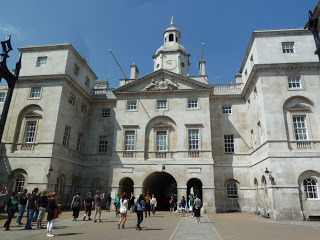 Entering Horse Guards
Entering Horse Guards
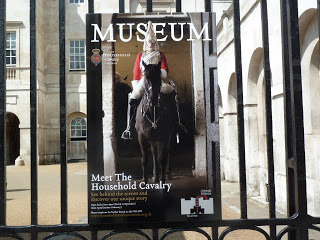 Museum Poster at the gate Though I'd visited many times, I had not known about the museum until Kristine and Greg went there (click here) and I had no idea where it was, though I didn't dare admit it at that moment, not wanting to drag Ed one more step than he needed to make... but what was this? In the place of the two red-coated guards always on either side of the gate, were riders in Black jackets. What was going on?
Museum Poster at the gate Though I'd visited many times, I had not known about the museum until Kristine and Greg went there (click here) and I had no idea where it was, though I didn't dare admit it at that moment, not wanting to drag Ed one more step than he needed to make... but what was this? In the place of the two red-coated guards always on either side of the gate, were riders in Black jackets. What was going on?
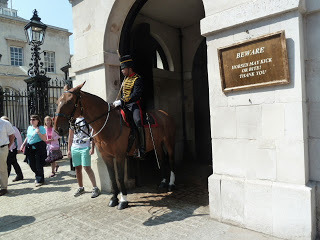
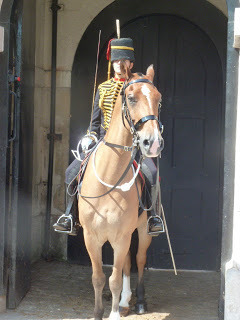
For a moment I wondered where I was, But there were crowds of people pouring into the parade grounds behind the building. Something was up. We followed along and sure enough, there was a group of horses and riders in formation.
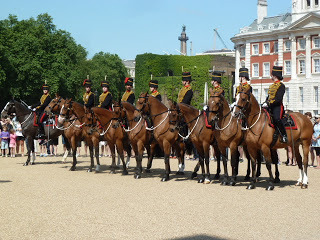
I think Ed even forgot his aching foot for a few minutes as we watched other riders join in. Below, the bugler arrives.
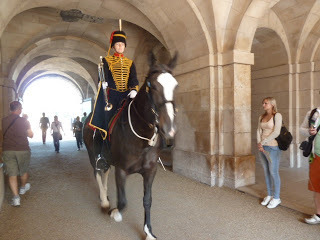
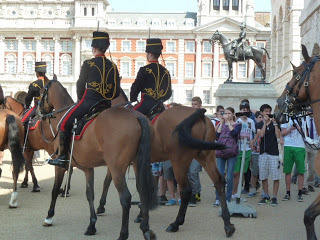 A good shot of the back of the uniforms. There were scads of tourists and hundreds, perhaps thousands of cameras clicking away. The riders formed up in a line headed by an officer. Nothing more happened except that the horses stamped and tossed their heads. The riders stayed as motionless as possible.
A good shot of the back of the uniforms. There were scads of tourists and hundreds, perhaps thousands of cameras clicking away. The riders formed up in a line headed by an officer. Nothing more happened except that the horses stamped and tossed their heads. The riders stayed as motionless as possible.
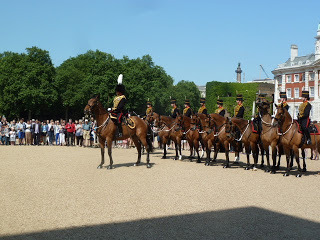 Horse Guards Parade is the location of the annual Trooping the Color when the Queen reviews the Household Cavalry; it was the tiltyard for jousting of the old Palace of Westminster. During the 2012 Olympics, it was the scene of the Beach Volleyball competition.
Horse Guards Parade is the location of the annual Trooping the Color when the Queen reviews the Household Cavalry; it was the tiltyard for jousting of the old Palace of Westminster. During the 2012 Olympics, it was the scene of the Beach Volleyball competition.
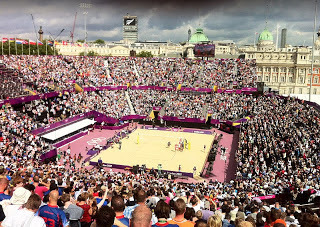 Beach Volleyball at Horse Guards Parade, 2012
Beach Volleyball at Horse Guards Parade, 2012
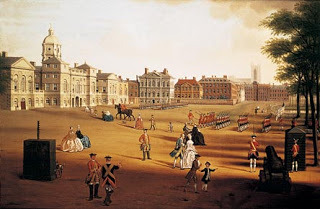 2nd Footguards on parade, by John Chapman, 18th Century
2nd Footguards on parade, by John Chapman, 18th Century
Quite a contrast among the views of Horse Guards, isn't there? I was happy to say that it showed no bad effects from the Olympics -- looked just the same as it had the last time I saw it for the Trooping of the Color in 2011. For that story, start by clicking here.
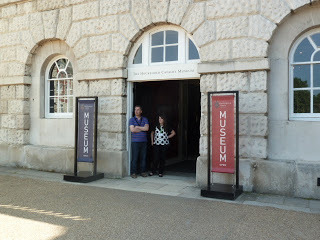 Household Cavalry Museum Entrance As we stood there watching the unmoving tableau, I looked around for a place for Ed to sit and rest his foot. Aha!! The Museum entrance. Certainly they'd have a bench!
Household Cavalry Museum Entrance As we stood there watching the unmoving tableau, I looked around for a place for Ed to sit and rest his foot. Aha!! The Museum entrance. Certainly they'd have a bench!
In the next adventure, we solve the mystery of the unusual uniforms on the riders and complete our visit to Horse Guards. And does Ed find a place to sit?? Coming soon.

I was undeterred. We checked into our hotel, the Pullman London St. Pancras, 100 Euston Rd. On my various trips to London, I try to find hotels in different parts of the city, so I can get to know more of various neighborhoods. Until recently, the Pullman was part of the French chain, Novotel; it's had extensive renovation since its purchase by the Pullman chain. It is located immediately west of the British Library which is just west of the St. Pancras Hotel and Station, where the Eurostar operates. Above, looking east from our floor.
 The little bistro where we had dinner featured a gnome on the table. LOL. Alongside the hotel, Charlton Street has an abundance of pubs, bistros and other small shops, many of which I suspect are under some threat from the extensive gentrification going on around there. Since the Eurostar moved to St. Pancras, the entire neighborhood has been upgrading, with all the positive and negative features of the process. Before leaving for Cambridge, we had one full day in London. In the morning, we started by taking the tube to Charing Cross station and waving our greetings to Charles I as he looks down Whitehall.
The little bistro where we had dinner featured a gnome on the table. LOL. Alongside the hotel, Charlton Street has an abundance of pubs, bistros and other small shops, many of which I suspect are under some threat from the extensive gentrification going on around there. Since the Eurostar moved to St. Pancras, the entire neighborhood has been upgrading, with all the positive and negative features of the process. Before leaving for Cambridge, we had one full day in London. In the morning, we started by taking the tube to Charing Cross station and waving our greetings to Charles I as he looks down Whitehall.
 Charles I The bronze statue has an interesting history. Charles I (1600-49) took the throne of England after the death of the first Stuart King, his father James I, in 1625. Hubert Le Sueur, a French sculptor, cast the statue in 1648, but before it was erected, the Civil War broke out and Charles I was beheaded. The statue was sold for scrap, but the purchaser never broke it down, instead hiding it until after the Restoration in 1660 when Charles II was welcomed back as the new monarch. Charles II purchased the statue of his father and had it installed where it now stands, looking toward the site of his beheading in front of the Banqueting House, about halfway down Whitehall toward Parliament.
Charles I The bronze statue has an interesting history. Charles I (1600-49) took the throne of England after the death of the first Stuart King, his father James I, in 1625. Hubert Le Sueur, a French sculptor, cast the statue in 1648, but before it was erected, the Civil War broke out and Charles I was beheaded. The statue was sold for scrap, but the purchaser never broke it down, instead hiding it until after the Restoration in 1660 when Charles II was welcomed back as the new monarch. Charles II purchased the statue of his father and had it installed where it now stands, looking toward the site of his beheading in front of the Banqueting House, about halfway down Whitehall toward Parliament.
 At the junction of The Strand and WhitehallCharles I is behind the traffic light at the right As Ed limped along, we made our way to Horse Guards. "We've been there before,:" he reminded me, as if I needed to be told. "Yes," I replied, thinking if you only knew how many times. "But we've never been to the Household Cavalry Museum." "Do they have places to sit down?" he said between clenched teeth. "Of course," I said, not really knowing if there was anything resembling a bench within 500 feet of the place.
At the junction of The Strand and WhitehallCharles I is behind the traffic light at the right As Ed limped along, we made our way to Horse Guards. "We've been there before,:" he reminded me, as if I needed to be told. "Yes," I replied, thinking if you only knew how many times. "But we've never been to the Household Cavalry Museum." "Do they have places to sit down?" he said between clenched teeth. "Of course," I said, not really knowing if there was anything resembling a bench within 500 feet of the place.
 Horse Guards on Whitehall I tried to divert Ed from his painful left foot by pointing out the Palladian style of the building, completed in 1753 to the plans of William Kent. "Remember the Kent name," I said to Ed. "We'll run into him later in Norfolk." Ed looked skeptical. "I thought we were in Kent a couple of years ago. What do you mean, run into him?" "This time I mean William Kent, the 18th century architect, not the English county. And definitely nor the cigarette brand I remember from college." Ed shrugged.
Horse Guards on Whitehall I tried to divert Ed from his painful left foot by pointing out the Palladian style of the building, completed in 1753 to the plans of William Kent. "Remember the Kent name," I said to Ed. "We'll run into him later in Norfolk." Ed looked skeptical. "I thought we were in Kent a couple of years ago. What do you mean, run into him?" "This time I mean William Kent, the 18th century architect, not the English county. And definitely nor the cigarette brand I remember from college." Ed shrugged.
 Entering Horse Guards
Entering Horse Guards
 Museum Poster at the gate Though I'd visited many times, I had not known about the museum until Kristine and Greg went there (click here) and I had no idea where it was, though I didn't dare admit it at that moment, not wanting to drag Ed one more step than he needed to make... but what was this? In the place of the two red-coated guards always on either side of the gate, were riders in Black jackets. What was going on?
Museum Poster at the gate Though I'd visited many times, I had not known about the museum until Kristine and Greg went there (click here) and I had no idea where it was, though I didn't dare admit it at that moment, not wanting to drag Ed one more step than he needed to make... but what was this? In the place of the two red-coated guards always on either side of the gate, were riders in Black jackets. What was going on?


For a moment I wondered where I was, But there were crowds of people pouring into the parade grounds behind the building. Something was up. We followed along and sure enough, there was a group of horses and riders in formation.

I think Ed even forgot his aching foot for a few minutes as we watched other riders join in. Below, the bugler arrives.

 A good shot of the back of the uniforms. There were scads of tourists and hundreds, perhaps thousands of cameras clicking away. The riders formed up in a line headed by an officer. Nothing more happened except that the horses stamped and tossed their heads. The riders stayed as motionless as possible.
A good shot of the back of the uniforms. There were scads of tourists and hundreds, perhaps thousands of cameras clicking away. The riders formed up in a line headed by an officer. Nothing more happened except that the horses stamped and tossed their heads. The riders stayed as motionless as possible. Horse Guards Parade is the location of the annual Trooping the Color when the Queen reviews the Household Cavalry; it was the tiltyard for jousting of the old Palace of Westminster. During the 2012 Olympics, it was the scene of the Beach Volleyball competition.
Horse Guards Parade is the location of the annual Trooping the Color when the Queen reviews the Household Cavalry; it was the tiltyard for jousting of the old Palace of Westminster. During the 2012 Olympics, it was the scene of the Beach Volleyball competition. Beach Volleyball at Horse Guards Parade, 2012
Beach Volleyball at Horse Guards Parade, 2012  2nd Footguards on parade, by John Chapman, 18th Century
2nd Footguards on parade, by John Chapman, 18th Century Quite a contrast among the views of Horse Guards, isn't there? I was happy to say that it showed no bad effects from the Olympics -- looked just the same as it had the last time I saw it for the Trooping of the Color in 2011. For that story, start by clicking here.
 Household Cavalry Museum Entrance As we stood there watching the unmoving tableau, I looked around for a place for Ed to sit and rest his foot. Aha!! The Museum entrance. Certainly they'd have a bench!
Household Cavalry Museum Entrance As we stood there watching the unmoving tableau, I looked around for a place for Ed to sit and rest his foot. Aha!! The Museum entrance. Certainly they'd have a bench!In the next adventure, we solve the mystery of the unusual uniforms on the riders and complete our visit to Horse Guards. And does Ed find a place to sit?? Coming soon.
Published on August 23, 2013 00:30
August 21, 2013
A Pinterest Post
The theme of this Pinterest Post is "things that might appear in an historical novel set in London."
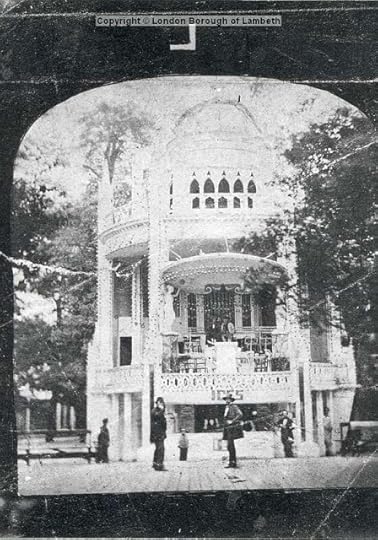
Date : c.1850 The Orchestra Stand at Vauxhall Gardens in the centre of the grove. The organ seen immediately below the roof with the orchestra seats below it and the supper-boxes on the ground floor. This is the first photograph I've ever seen of Vauxhall. If you know of others, please share. I must say, the image below paints a much more romantic view of the Gardens. Note: Vauxhall Gardens closed for the last and final time in 1859.
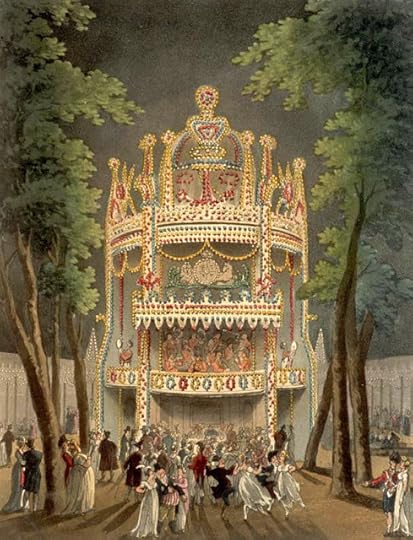
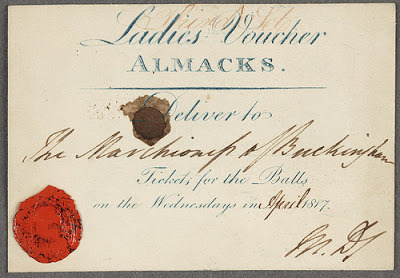 From what I can tell, this was pinned from author Jo Beverly's Flicker page - small world, isn't it?
From what I can tell, this was pinned from author Jo Beverly's Flicker page - small world, isn't it?
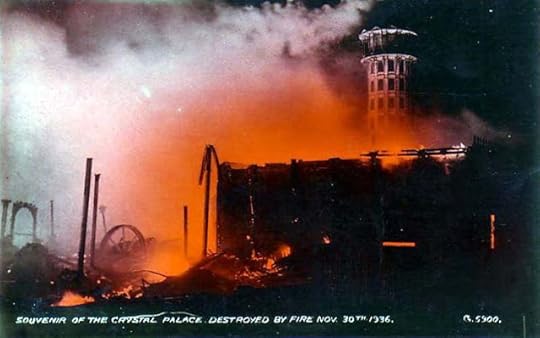
The Crystal Palace fire, November 30, 1936 and the ruins of the Palace below.
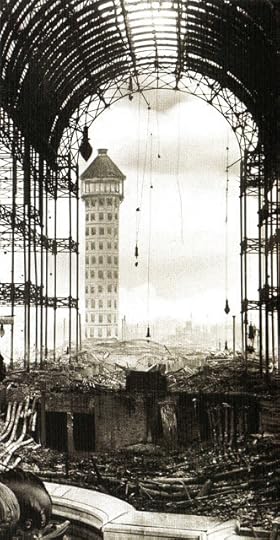
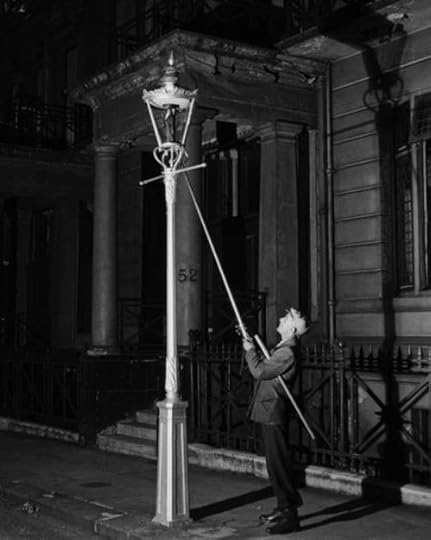 Lamplighter, c.. 1930
Lamplighter, c.. 1930 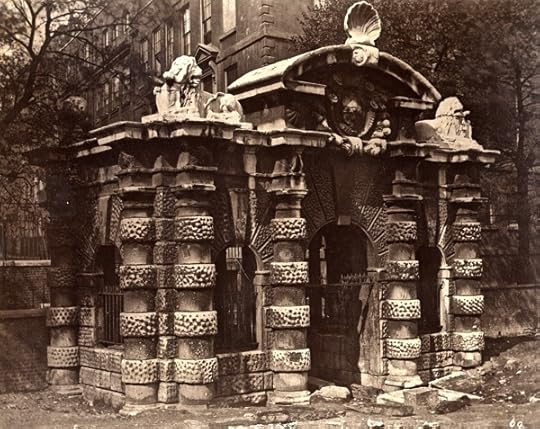
This water gate stood at the river’s edge, fifty yards from Samuel Pepys’ house. Built in 1626, as the triumphal entry for the Duke of Buckingham to York House, since the Victoria Embankment was completed in 1870 it has been marooned a hundred yards from the Thames. From "In Search of Relics of Old London" at Spitalfields Life.
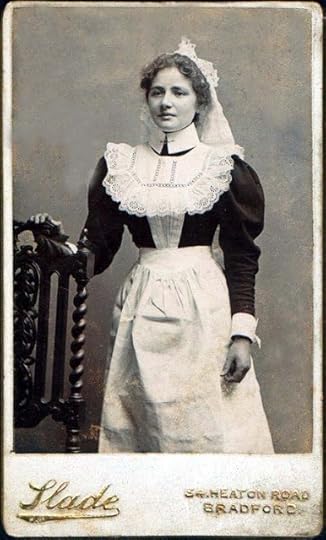
An Edwardian housemaid
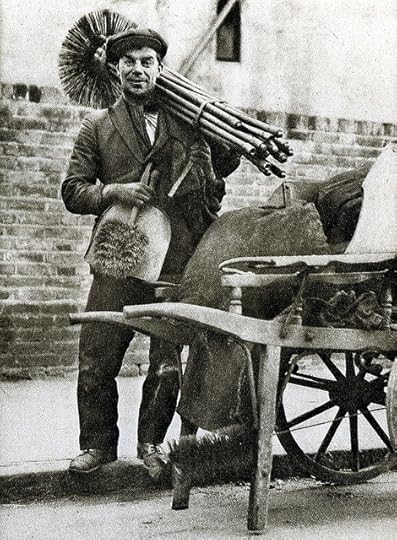
1920's chimney sweep
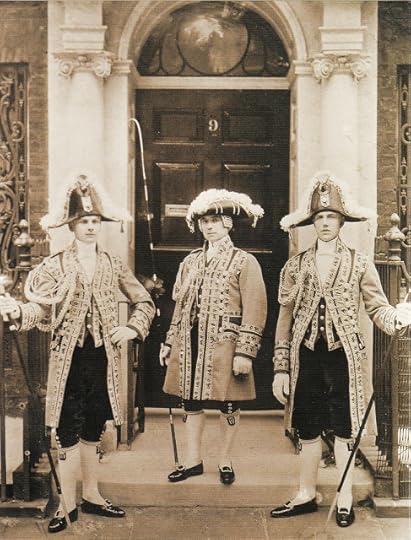
Coachman and Footmen of the 3rd Lord Egerton of Tatton outside 9 Seamore Place, Mayfair. Before the Coronation of George V. Cheshire County Council/National Trust.
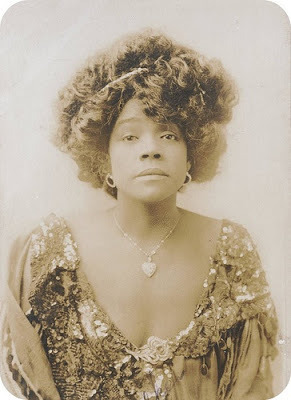 Aida Overton Walker dazzled early-twentieth-century theater audiences with her original dance routines, her enchanting singing voice, and her penchant for elegant costumes. One of the premiere African American women artists of the turn of the century, she popularized the cakewalk and introduced it to English society.
Aida Overton Walker dazzled early-twentieth-century theater audiences with her original dance routines, her enchanting singing voice, and her penchant for elegant costumes. One of the premiere African American women artists of the turn of the century, she popularized the cakewalk and introduced it to English society.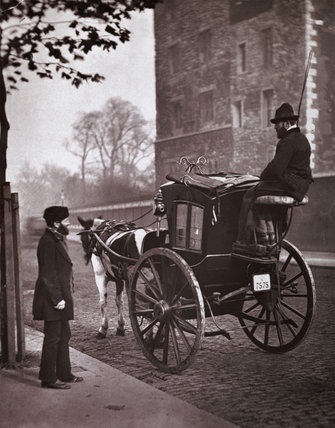
London Cabmen: c.1877, John Thomson
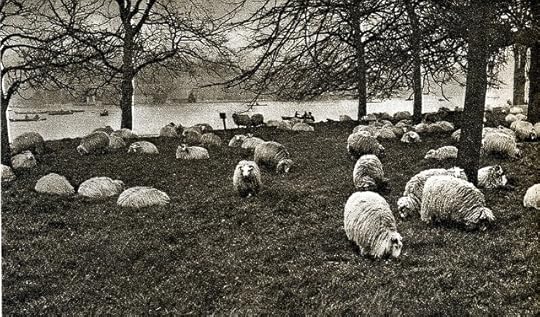
1920's - sheep grazing beside the Serpentine, Hyde Park
You can find all of my Pinterest boards here.
Published on August 21, 2013 00:00
August 19, 2013
A Couple In England - Day 10 - Part Two
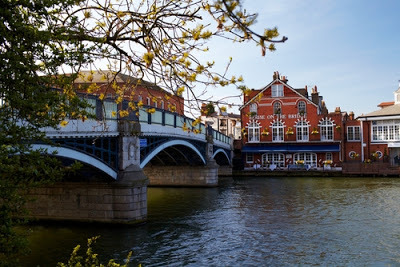
After leaving the Guildhall, Hester and I took a leisurely stroll down to the Thames and stood on the bridge.
"One day I'm going to come back and take the boat ride," I sighed.
"You've never done the boat?" Hester asked.
"No. I never have the time. There's always somewhere to rush off to see."
"Speaking of which," Hester said, looking at her watch, "we'd better get ourselves some lunch before it's time for the kitchen tour at the Castle."
So off we went and found ourselves a nearby restaurant, where we ordered tomato basil soup accompanied by warm bread with lashings of butter and two lattes. I can't recall exactly what Hester and I discussed over the meal, though it had something to do with conducting research at the Royal Archives, the families (ours, rather than Royal) and other odds and ends. Afterwards, we made our way to the Castle.
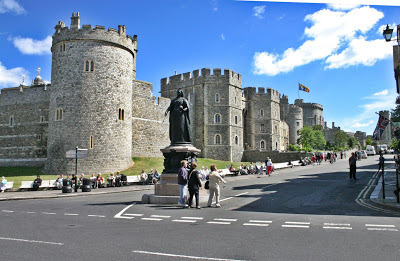
"Tell me the truth," I said to Hester as we made our way to the entrance, "are you heartily sick of my dragging you to the Castle? It seems like I make you do it every time I visit."
"But I've never seen the kitchens," she said. "I'm really looking forward to it."
We arrived early enough for us to visit the gift shop.
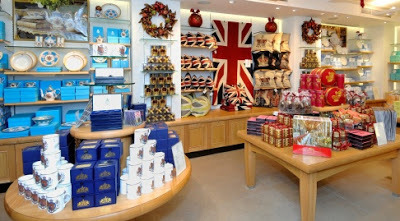
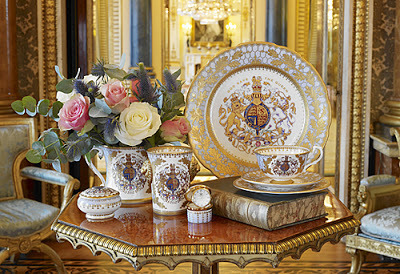 I was on the hunt for a Golden Jubilee item to add to my collection and there wasn't a shortage of items on offer. Which should I choose? Hhhmmmm. Before I could decide, it was time for the Kitchen Tour, so Hester and I made our way over to the meeting point.
I was on the hunt for a Golden Jubilee item to add to my collection and there wasn't a shortage of items on offer. Which should I choose? Hhhmmmm. Before I could decide, it was time for the Kitchen Tour, so Hester and I made our way over to the meeting point.
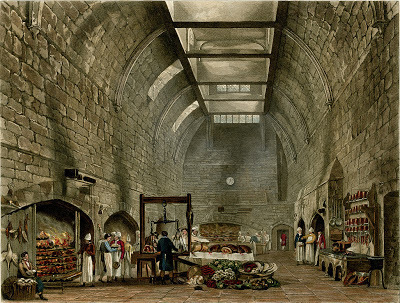 Above is a rendering of the vast Windsor Castle kitchen in late Georgian days. The present day kitchen tour "takes you behind the scenes to the oldest working kitchen in the country, in constant use for nearly 750 years. Today, staff of the Royal Household use the Great Kitchen to prepare food for both grand ceremonial occasions, such as State Banquets, and more informal events in the royal diary. Your guide will tell you about the devastating fire of 1992 and how restoration work uncovered the Great Kitchen’s original medieval structure. You will hear about royal dining, past and present, and have a fascinating insight into Windsor Castle as a working royal palace." In addition, the tour includes the State Entrance and the medieval Undercroft, areas not normally open to the public.
Above is a rendering of the vast Windsor Castle kitchen in late Georgian days. The present day kitchen tour "takes you behind the scenes to the oldest working kitchen in the country, in constant use for nearly 750 years. Today, staff of the Royal Household use the Great Kitchen to prepare food for both grand ceremonial occasions, such as State Banquets, and more informal events in the royal diary. Your guide will tell you about the devastating fire of 1992 and how restoration work uncovered the Great Kitchen’s original medieval structure. You will hear about royal dining, past and present, and have a fascinating insight into Windsor Castle as a working royal palace." In addition, the tour includes the State Entrance and the medieval Undercroft, areas not normally open to the public.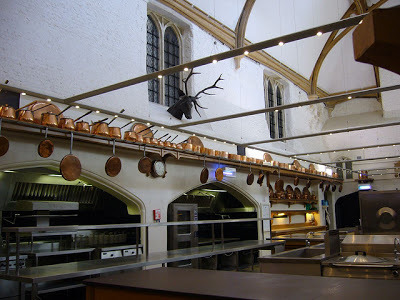 The copper cookware you see in the photo above all bear the cypher of King George IV and the cast iron stoves installed by Prince Albert are still in place, though now rarely used. The kitchens were deserted when we tour them, the photo below being one I swiped off the internet, as photography was not allowed.
The copper cookware you see in the photo above all bear the cypher of King George IV and the cast iron stoves installed by Prince Albert are still in place, though now rarely used. The kitchens were deserted when we tour them, the photo below being one I swiped off the internet, as photography was not allowed.
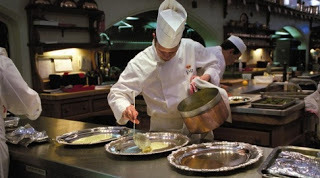 As stated above, the tour also included halls and passages that are rarely on show, so that we found ourselves walking through stone corridors that appeared untouched since at least the Georgian era. It was a rare insight into this magnificent building.
As stated above, the tour also included halls and passages that are rarely on show, so that we found ourselves walking through stone corridors that appeared untouched since at least the Georgian era. It was a rare insight into this magnificent building.
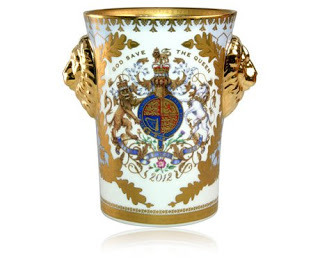 After the tour, we returned to the gift shop, where I finally made up my mind and purchased the Jubilee beaker above. It now holds pride of place on my living room mantle.
After the tour, we returned to the gift shop, where I finally made up my mind and purchased the Jubilee beaker above. It now holds pride of place on my living room mantle. The Final Installment In This Series Coming Soon!
Published on August 19, 2013 00:30
August 17, 2013
England's First Pedestrian Automobile Fatality
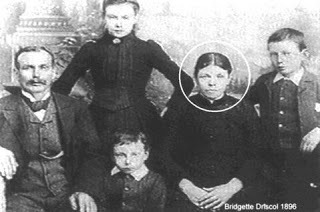
The first person world-wide who died as a result of being hit by a car (not in a car crash) was Mrs. Bridget Driscoll, a 44 year old pedestrian of Croydon, Surrey. As she and her daughter May crossed the road on the grounds of the Crystal Palace on 17 August 1896, a car being driven by Arthur James Edsall of Upper Norwood approached. According to witnesses, the car hit Mrs Driscoll "at tremendous speed,"of about 6 kilometres per hour. The inquest into Mrs Driscoll's death lasted for about 6 hours, after which the jury returned a verdict of "accidental death." No prosecution was made. It is rather ironic that the coroner at the inquest, Percy Morrison, stated, "This must never happen again." You can read the full story at the BBC News Magazine website.
*The first pedestrian killed by a motor car in the United States was Henry Hale Bliss, who was hit by a car in New York City on 14 September 1899.
Published on August 17, 2013 00:00
August 16, 2013
A Second Aside: Travels in Germany
Victoria here. Before I go into raptures about my recent visit to England, I will wrap up our preceding couple of weeks on the continent.
My first awareness of the city of Dresden was by reading Kurt Vonnegut's 1969 novel Slaughterhouse-Five about the firebombing of Dresden near the end of WWII. Vonnegut was an American prisoner of war and present for the bombing.
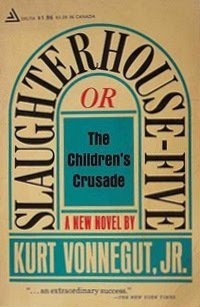
Little was left of the city after the attack. Here is a picture I found, also available in many places as a postcard, showing the ruins.
 It is hard to believe today that once the city had little left intact, as it has been beautifully reconstructed mostly in the original styles. As in Berlin, the guides made sure our group of American and British tourists knew the story and that the US and UK carried out the bombing, but they always added the attacks were in retribution for the bombing of Britain by the Germans and other war atrocities.
It is hard to believe today that once the city had little left intact, as it has been beautifully reconstructed mostly in the original styles. As in Berlin, the guides made sure our group of American and British tourists knew the story and that the US and UK carried out the bombing, but they always added the attacks were in retribution for the bombing of Britain by the Germans and other war atrocities. Below are a few views of the city which I found lively and prosperous today, full of fascinating art.
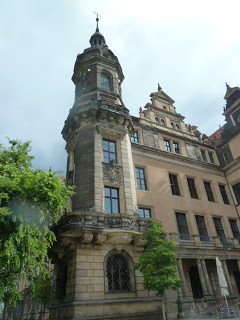 Residenzschloss
Residenzschloss 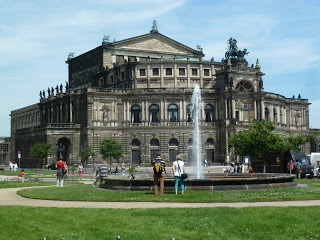 Semperopera
Semperopera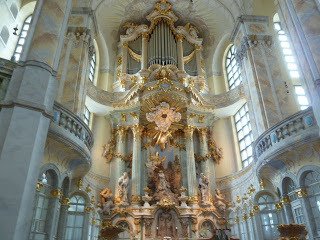 interior, Frauenkirche
interior, Frauenkirche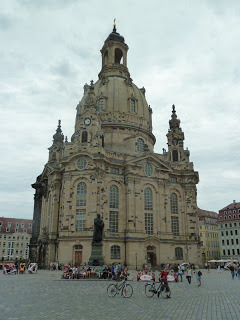 Frauenkirche
Frauenkirche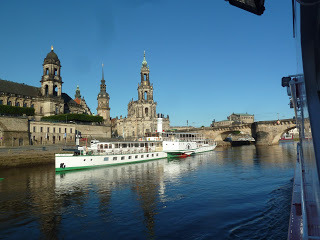 from the Elbe
from the ElbeA bit farther down the river, we visited the Worlitz Garden near Dessau. Prince Leopold Friedrich Franz of Anhalt-Dessau (1740-1817) traveled through Holland and England when he was hardly more than a teen. He loved the architecture and gardens he saw and created his own Landscape Garden and mansion in the Georgian style, completed in 1783. It is now a UNESCO World Heritage site, a little bit of Capability Brown and his cohorts in Germany. For more information, click here.
To the delight of Ed's suffering foot, we took a boat ride around the lakes and canals, which looked like many gardens we've visited in Britain.
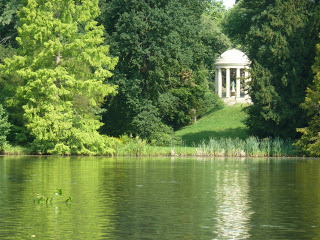 Venustemple
Venustemple 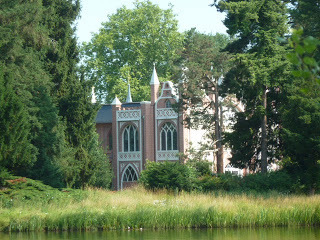 Gotisches Haus
Gotisches Haus 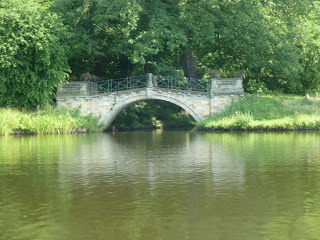
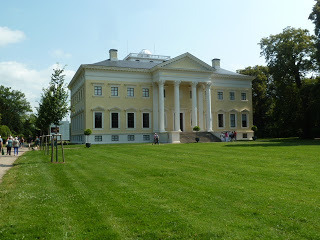 Landhaus
Landhaus The guides pointed out the resemblance of the Landhaus to another famous house built about the same time in Washington, D.C., but I could find no specific information that the architects of either one consulted the other, just chose the currently fashionable neo-classic style for their buildings. The Landhaus was the work of Friedrich Wilhelm von Erdmannsdorff (1736-1800); the White House was built by architect Benjamin H. B. Latrobe (1764 – 1820).
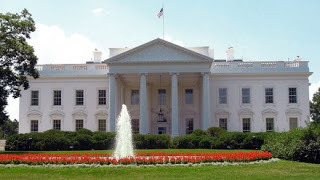 The White House
The White HouseA few days later, we left the River Elbe and the MV Clara Schumann and bussed to Potsdam, on the outskirts of Berlin, where we toured the Neues Palais, vast structures in acres of parks, worthy of several more days browsing.
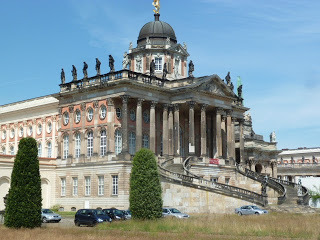 We made a stop at the palace where the Potsdam Agreement was drawn up in 1945, making plans for the governance of Germany. To my utter surprise, it looked like a slice of Shakespeare's England.
We made a stop at the palace where the Potsdam Agreement was drawn up in 1945, making plans for the governance of Germany. To my utter surprise, it looked like a slice of Shakespeare's England. 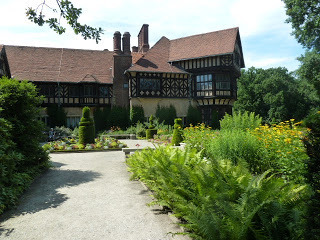 When we arrived in Berlin, we had to say farewell to our Cruise Director Stefanie who had so capably guided us all the way from Prague. She is charming and witty and we thank her very much!
When we arrived in Berlin, we had to say farewell to our Cruise Director Stefanie who had so capably guided us all the way from Prague. She is charming and witty and we thank her very much!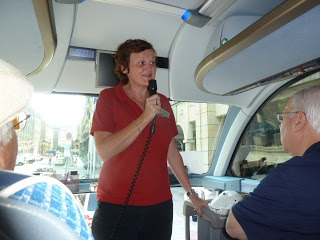 Here are a few views of our trips through Berlin...only a little truncated by Ed's malady. We did manage to see quite a lot as he soldiered on despite his pain. Berlin is in the midst of another great boom in building....crowded with every teenager in Europe and from Japan, at least those who weren't in London!
Here are a few views of our trips through Berlin...only a little truncated by Ed's malady. We did manage to see quite a lot as he soldiered on despite his pain. Berlin is in the midst of another great boom in building....crowded with every teenager in Europe and from Japan, at least those who weren't in London!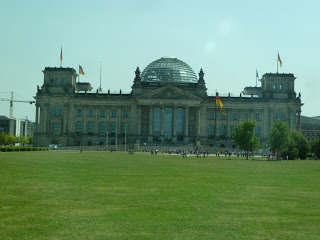 Reichstag
Reichstag 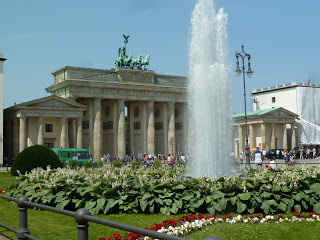 Brandenburger Tor
Brandenburger Tor 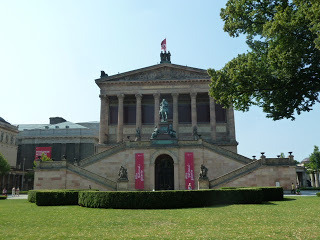 Neues Museum
Neues Museum
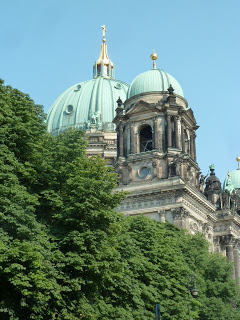 Berliner Dom
Berliner Dom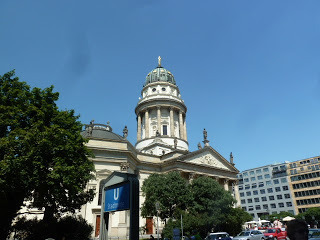 Deutscher Dom, now a museum of German history, on the Gendarmenmarkt By the time we flew from Berlin to Heathrow to whirl through our seven days in London, Ed's toe blisters were excruciating and even with many layers of bandages and padding, always hurting. As I e-mailed to Kristine, at least we had avoided the cholera! Coming next: London, Cambridge, Houghton Hall, Holkham Hall, and more London
Deutscher Dom, now a museum of German history, on the Gendarmenmarkt By the time we flew from Berlin to Heathrow to whirl through our seven days in London, Ed's toe blisters were excruciating and even with many layers of bandages and padding, always hurting. As I e-mailed to Kristine, at least we had avoided the cholera! Coming next: London, Cambridge, Houghton Hall, Holkham Hall, and more London
Published on August 16, 2013 00:00
August 14, 2013
A Couple In England - Day 10
After Hampton Court Palace, Hubby and I went back to the Castle Hotel and rested for a while before venturing out again for dinner. This time, we ventured a whole two blocks away, just down the High Street to the Duchess of Cambridge pub.
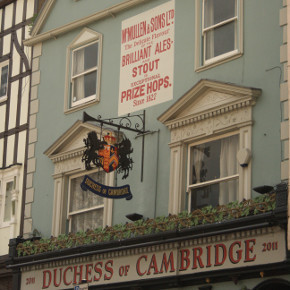
Soon after we'd sat down, I realized that the three blokes at the next table were ardently discussing Downton Abbey. I tried to eavesdrop, naturally, but it was hard to decipher every word and, besides, I was distracted by the Duchess of Cambridge. The Duchess of Cambridge who? I wracked my brain for an historical Duchess of Cambridge who'd rank pub name status. In Windsor, no less. Which Duchess of Cambridge had ties to Windsor? Princess Augusta, who'd married Prinny's brother, the Duke of Cambridge? Hadn't they spent a good portion of their time in Hanover, rather than England? And his son, George, had married an actress, whose existence was ignored by the entire Royal Family and she'd been denied the title HRH, anyway. And upon George's death, the title became extinct until it was bestowed upon the present Prince William. Hhhmmmm . . . .
"Hon?"
"Huh?"
"You were off in a cloud. What are you thinking about?" Hubby asked.
I opened my mouth to answer, realized what I'd been thinking about, and said instead, "Nothing."
Our waiter approached to take our orders. "Can you tell me which Duchess of Cambridge the pub is named for?" I asked.
"Er, Kate Middleton?" he answered.
This brought me up short. "But the pub's been here for years. I've been here before, long before Kate was the Duchess of Cambridge."
"Oh, yeah, it's been here for centuries, but it wasn't named the Duchess of Cambridge then. We just changed the name last year."
Ah, now I felt better, although slightly tricked.
After dinner, we made an early night of it and the next day I met Hester at the Guildhall for a private, guided tour of the Museum - where Hester got to meet the Queen.
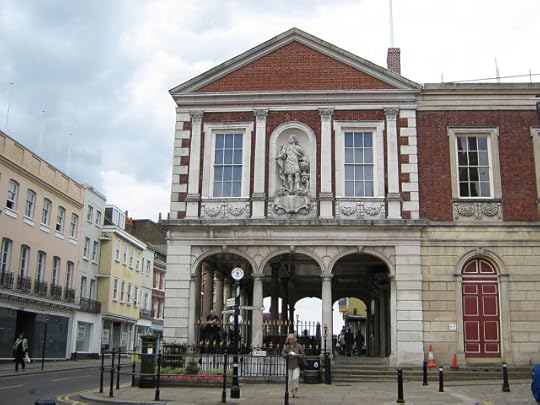
The present Guildhall replaced an older cornmarket and was built in the late 17th century and is often associated with Christopher Wren, although there's no evidence of this. The Museum itself is housed in a 19th century extension and serves to display items of local history.
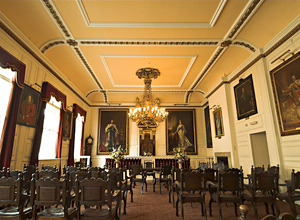
Upstairs, royal portraits adorn the walls, including one of himself given by Prinny which was so large the council had to take a window out to fit it in. Also upstairs is the room where Prince Charles married Camilla - dubbed by myself as "the scene of the crime." The room contains several stained glass windows and more portraits, including a grim one of Queen Victoria and a rather nice one of the present Queen when young.
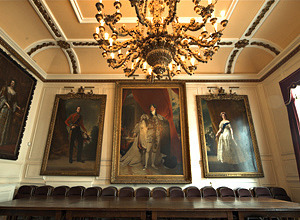
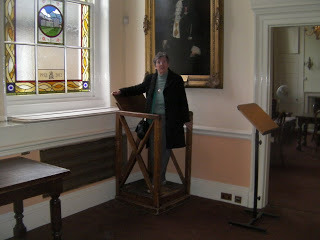 Here's Hester standing in the very room where, by the way, Elton John was also married. To the left in the picture above can be seen one of the new Diamond Jubilee windows, showing Balmoral Castle.
Here's Hester standing in the very room where, by the way, Elton John was also married. To the left in the picture above can be seen one of the new Diamond Jubilee windows, showing Balmoral Castle.Here's the story of the dock, or pulpit, Hester is standing upon in Hester's own words: "In 1882 a Scotsman, Roderick McLean, attempted to shoot Queen Victoria at the railway station. He missed, but was arrested and was to be brought before the magistrates in the Guildhall next day, for formal proceedings to send him for full trial in Reading (county town). But there wasn't a dock. So overnight a carpenter knocked up the piece of furniture you see. McLean was duly arraigned and despatched for a full trial at Reading. There he was found 'Not guilty but insane.' The Queen was furious, there was a big fuss and the result was that today in such cases the verdict is recorded 'Guilty but insane.' McLean spent the rest of his life in a mental asylum. Why did he want to shoot the Queen? He had sent her some poetry he'd written, and she hadn't said thank you! (I always draw the moral when children are present.) Nowadays this dock is used by witnesses giving evidence at Coroners' Courts."
Part Two Coming Soon!
Published on August 14, 2013 00:00
August 12, 2013
The Wellington Connection: Lord Londonderry
From The Despatches, Correspondence, and Memoranda of Field Marshal Arthur, Duke of Wellington
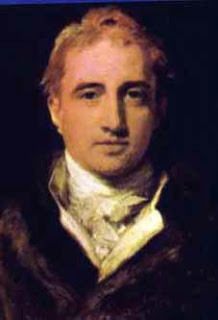
Robert Stewart, Viscount Castlereagh, Lord Londonderry
Wellington's letter to Mr. Bankhead
London, 9th Aug.. 1822
Dear Sir: I called upon you with the intention of talking to you about Lord Londonderry, and of requesting you would call upon him. He promised me that he would send for you, but, lest he should not, I entreat you to find some pretence for going down to him. I entertain no doubt that he is very unwell. It appears that he has been overworked during the session, and that his mind is overpowered for the moment and labours under a delusion. I state the impression made upon me in the interview I have just had with him. I told him that this was my impression, and I think it is his own, and he will probably communicate it to you; but, lest he should not, I tell you what I think, begging you never to mention to anybody what I have told you. I am setting out this moment for the Netherlands; I would have stayed with Lord Londonderry, but he would not allow me. I shall be very much obliged to you if you will write me a line and have it left at my house to let me know how you find him, and particularly if you think I am mistaken.
Ever, dear Sir, yours most faithfully,
Wellington
Mr. Bankhead to Field Marshall the Duke of Wellington
Lower Brook Street, 9th Aug., 1822
My Lord,
I am this moment (8 o'clock) returned to my own house from Lord Londonderry's, where I have been for two hours; and I lose not a moment in answering the letter which your Grace has condescended to write to me. Thirty years intimacy with Lord Londonderry makes me know his peculiarities intimately. His nerves are never unstrung unless when he has some bodily indisposition. I conceive that at this moment he has a preternatural fullness of the vessels of the head, and that this (rather than the wear and tear of work) makes him nervous. I have had him cupped, and he experiences the greatest possible relief in the feelings of his head and of his mental competency.He is gone down to Cray with Lady Castlereagh, and I purpose to see him there to-morrow. Perhaps a feverish affection of a few days may follow this casual derangement of the system, but knowing the natural soundness of Lord Londonderry's constitution, I have no doubt but that by quietness and ordinary care of a few days he is likely soon again to be reinstated in his general health.I know that Lady Londonderry has written a few lines to your Grace before she left St. James's Square.I have the honour to be,your Grace's most obedient humble servant,Charles Bankhead
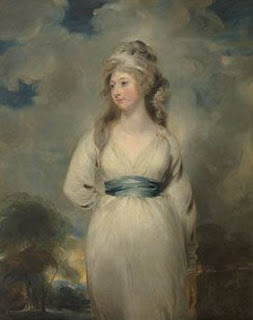 Lady Amelia Anne Hobart, Marchioness of Londonderry
Lady Amelia Anne Hobart, Marchioness of Londonderry
To the Duke of Wellington from the Marchioness of LondonderryLondon, 9th Aug., 1822.
My Lord: From your kind feeling with respect to Lord Londonderry I am sure you will be glad to hear that he saw Bankhead, who ordered him to be cupped. The blood resembled jelly, and he was instantly relieved, and I have hopes that he will be well in a few days; but I really think he was upon the verge of a brain fever.
Yours most sincerely,A.Londonderry
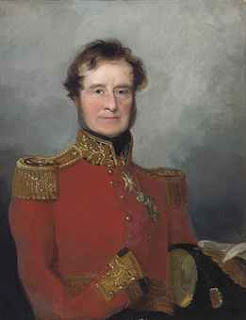 Lord Fitzroy Somerset, afterwards 1st Baron Raglan
Lord Fitzroy Somerset, afterwards 1st Baron Raglan
Lord Fitzroy Somerset to Field Marshal the Duke of Wellington.
London, 12th August, 1822.
My Dear LordIt is with great concern that I have to announce to you the melancholy intelligence of the death of Lord Londonderry, which took place, by his own hands, this morning between seven and eight o'clock.I enclose a copy of Bankhead's statement, which will show you what occurred from the time you first sent him to attend Lord Londonderry, and will prove to you that you were right in the apprehensions you expressed to Bankhcad that his mind was not what it ought to be.Lord Liverpool, whom I saw as soon as he arrived from Combe Wood, desired me to communicate this lamentable event to you, and to express to you his wish that you should return to England immediately. He is in the greatest distress. His first idea was to set off for Scotland immediately, and break the intelligence to his Majesty himself; but upon reflection he has thought it best not to leave London, but to depute Mr. Peel to do that office for him. He laments your absence amazingly, and would have requested you to go to the King if you had been in the way. As it is, however, his Majesty is better prepared for the shock than anybody else, for he mentioned to Lord Liverpool on Saturday, that he had seen Lord Londonderry the day before, and was quite convinced that he was not right in his mind, and that he felt great alarm for the consequences of the break up of such a mind as Lord Londonderry's. Lord Liverpool has written to the King, and entreated his Majesty not to make any arrangement for filling Lord Londonderry's office till his return from Scotland, assuring him that he will keep the machine going till that time in the best way he can.I understand from Bankhead that Lady Londonderry apprehended the possibility of Lord Londonderry's making away with himself, and placed everything out of his reach that she thought him likely to make use of; but unfortunately he had in one of his despatch-boxes the knife with which eventually he put an end to his life. He had got up in the night and gone into the dressing-room to wash his face, and then returned quietly to his bed.I presume you will be able to arrive here between Thursday and Friday. Lord Liverpool looks forward to your return with great anxiety. Lord Westmorland and Lord Maryborough are the only ministers in town. The latter would have written to you, but Lord Liverpool has employed him to write to Lord Harrowby and Lord Wellesley; and as I am writing, he thinks it unnecessary to do so.Your most faithful and affectionate,Fitzroy Somerset Enclosure- Fife House, 12th Aug., 1822.
From the time Dr. Bankhead first saw Lord Londonderry on Friday evening last he was satisfied that his head was seriously affected, and that he laboured under very general mental delusion. He had been cupped in his house in St. James's Square on that evening, from which he seemed much relieved; and in the quiet of the evening Lord and Lady Londonderry went down to Cray, Dr. Bankhead promising to follow them the next day, and to stay at Cray all Sunday. On Friday night Lord Londonderry was restless, and asking many questions during the night, which manifested incoherence and delirium. On Saturday morning he took some opening medicine which Dr. Bankhead had sent him, remained in his bed all the day, and was kept particularly quiet, using slops only as nourishment, and barley-water as drink.
When Dr. Bankhead arrived at Cray in the afternoon of Saturday he found Lord Londonderry rather better from the favourable operation of the cooling medicine, but still there was heat and fever, great thirst, and an unusual watchfulness and suspicion of manner, and a constant anxiety lest he should not be well enough to go abroad in the appointed time. He asked several questions very irrelevant and quite at variance with his usual calm manner. In the night of Saturday he had some refreshing sleep, but on the whole of Sunday his fever still continued, as well as the delirium and unhappiness of mind and manner. Dr. Bankhead quitted his room about midnight, leaving his Lordship tolerably comfortable, and Lady Londonderry in the room with him, both retiring to rest. Dr. Bankhead slept in a room close to his Lordship, and on the morning of this day, about 7 o'clock, Lady Londonderry's maid called him, saying that Lord Londonderry wished to see him. Dr. Bankhead instantly repaired to the bedroom, but found that his Lordship had that moment gone into the dressing-room adjoining to the bedroom. On entering this instantly, the Doctor saw Lord Londonderry standing opposite to the window with his face to the ceiling, having on his dressing-gown. The Doctor immediately ran towards him, saying, "My dear Lord, why do you stand so?" upon which, without turning, he answered, "Bankhead, let me fall upon your arm; it is all over." In the agony of the moment, Dr. Bankhead caught him on his arm, and, dreadful to relate, saw a short-bladed knife in his right hand fiercely clenched, with which he had deeply divided the carotid artery; and from the sudden effusion of blood he fell instantly from Dr. Bankhead's arms on his face upon the floor, and was instantly dead without a struggle.
The Duke then wrote: 13th Aug., 1822.I saw Lord Londonderry frequently during the last days of his life.I dined with him on Saturday, the 3rd of August, at Cray, and sat next to him at dinner. There was a very large party, and I thought Lord Londonderry was in particularly good spirits at dinner.I had occasion, both before and after dinner, to talk to him on subjects on which the delusions of his mind would have appeared, if he had at that time laboured under any. They related to certain anonymous letters received by Mr. Arbuthnot and others of the Treasury, which were known to come from a person by the name of Jennings, who had been under examination before a committee of the House of Commons; and although I thought Lord Londonderry was cold in his manner on the subject of some of these letters, which was not unusual with him, I never saw him more decided or more clear in his opinion. I saw a letter from him to Mr. Arbuthnot on the same subject the next day, Sunday, the 4th of August, in which he expressed himself with more than usual clearness and decision.I did not see Lord Londonderry on Monday the 5th, but on Tuesday the 6th he came to the Ordnance office early, to a meeting of certain persons to consider of the means of reforming the commissariat in Canada. Upon this occasion I thought him very low. He took no part in the discussion, and manifested no interest in it. After the meeting had broken up he waited to talk to Mr. Arbuthnot and me about Jennings's letters, about which he showed that he felt more than I thought he had on the preceding Saturday, but there was no appearance of agitation respecting them.I met Lord Londonderry at the Cabinet on Wednesday the 7th of August. The subject of discussion was the instructions for himself on his mission to Vienna. Lord Liverpool read them to the Cabinet, and there was some discussion upon them; but Lord Londonderry took no part in the discussion, and he appeared very low, out of spirits, and unwell. There was, however, no appearance of agitation. After the Cabinet was over I went into Mr. Beckett's, and after leaving him I met Lord Londonderry as he was coming out by the back door of his office. We walked together through the Park and the Ordnance office to his own house. Lord Londonderry was remarkably low and silent. He held me by the arm, but scarcely said a word; but there was no symptom of agitation.After leaving him at his door I returned to my office, and in about half an hour went to Carlton House to take leave of the King previous to my departure for the Netherlands. I found Lord Londonderry at Carlton House. The King was gone out, and I walked with Lord Londonderry back to his own house, where I left him. He was equally low as before.I had occasion, in about an hour afterwards, to go to my own house, and as I was returning down the Park I stopped to speak to his Royal Highness the Duke of York, who was in his buggy. Lord Londonderry came up the Park on horseback, and joined us, and in a few seconds I left him and the Duke of York together; he then appeared very low and out of spirits.I did not see him on Thursday the 8th of August.On Friday the 9th I was proceeding on horseback through St James's Square from the Ordnance office to my own house, to set out for the Continent at about four o'clock in the afternoon. Lady Londonderry called to me, and was talking to me from her window, when Lord Londonderry passed me in rather a quick and hurried pace, and told me he wanted to speak to me. I followed him into his house and his room.I cannot give a better account of what passed in this interview than by copying a letter which I wrote to Mr. Arbuthnot (who had left London that evening) immediately after it was concluded, before I set out for Dover:—
London, 9th August, 1822.
My Dear Arbuthnot
"I am just setting off, but I cannot go without making you acquainted with the impression made upon my mind by an interview I have just had with Lord Londonderry."It appears to me that his mind and body have been overpowered by the work of the session, and that he is at this moment in a state of mental delusion. He took me into his house to talk to me about the same story that he told to you and to Lord Liverpool; and, strange to say, he imagined from my manner at the last Cabinet and afterwards walking home with him that I had heard of something against him and believed it. He thought the same of the Duke of York; and he told me some strange story of a man telling him this day that his horses were waiting for him when he was coming out of Carlton House, of his not having ordered his horses to town, and of the arrival of the horses, and of his being informed of their arrival, as proofs that the person who had ordered up his horses, and that the person who informed him they were waiting, thought there was so much against him that he ought to fly the country. This impression was so strong upon his mind that he rung the bell to desire that inquiry might be made as to who had ordered up his horses, and the delusion was not removed till he was informed that the horses were not in town."He is certainly very unwell, and I did not conceal from him my opinion that he was so, and that his mind was not in its usual and proper state. I offered to stay with him, but he would not allow me, as he said it would make people believe that there was some reason for it. I begged him to send for Dr. Bankhead, and, between ourselves, I have informed Dr. Bankhead that it is my opinion that he is labouring under a temporary delusion. He cried excessively while talking to me, and appeared relieved by it and by his conversation with me, and he promised me to see Bankhead."I am afraid that he has mentioned the story above referred to, to more persons than Lord Liverpool, you, and me. I have entreated him to say no more about it to anybody, but I fear he will."I write you all this in order to urge you to see him as soon as you can after you will return to London and observe him well, and see if his mind is quite right. If it is not, and he should go abroad, I think you ought to make him take Bankhead with him; and, if that is not accomplished, I think you ought to mention the matter to Planta. Otherwise, it is my opinion that this impression of mine should never go beyond ourselves."He is quite clear and right about public matters, but agreed with me that his mind had been overpowered by the work of the session, and that he was labouring under a delusion."Destroy this letter, and believe me, etc. Wellington."
The remains of the noble Marquess, after lying in state for several days, were removed from his house in St. James's Square, followed by the Ministers of State, principal Nobility, and private frienels of his Lordship, in carriages, and interred, with funeral pomp, in Westminster Abbey, or Thursday, the 22d of August, 1822.

Robert Stewart, Viscount Castlereagh, Lord Londonderry
Wellington's letter to Mr. Bankhead
London, 9th Aug.. 1822
Dear Sir: I called upon you with the intention of talking to you about Lord Londonderry, and of requesting you would call upon him. He promised me that he would send for you, but, lest he should not, I entreat you to find some pretence for going down to him. I entertain no doubt that he is very unwell. It appears that he has been overworked during the session, and that his mind is overpowered for the moment and labours under a delusion. I state the impression made upon me in the interview I have just had with him. I told him that this was my impression, and I think it is his own, and he will probably communicate it to you; but, lest he should not, I tell you what I think, begging you never to mention to anybody what I have told you. I am setting out this moment for the Netherlands; I would have stayed with Lord Londonderry, but he would not allow me. I shall be very much obliged to you if you will write me a line and have it left at my house to let me know how you find him, and particularly if you think I am mistaken.
Ever, dear Sir, yours most faithfully,
Wellington
Mr. Bankhead to Field Marshall the Duke of Wellington
Lower Brook Street, 9th Aug., 1822
My Lord,
I am this moment (8 o'clock) returned to my own house from Lord Londonderry's, where I have been for two hours; and I lose not a moment in answering the letter which your Grace has condescended to write to me. Thirty years intimacy with Lord Londonderry makes me know his peculiarities intimately. His nerves are never unstrung unless when he has some bodily indisposition. I conceive that at this moment he has a preternatural fullness of the vessels of the head, and that this (rather than the wear and tear of work) makes him nervous. I have had him cupped, and he experiences the greatest possible relief in the feelings of his head and of his mental competency.He is gone down to Cray with Lady Castlereagh, and I purpose to see him there to-morrow. Perhaps a feverish affection of a few days may follow this casual derangement of the system, but knowing the natural soundness of Lord Londonderry's constitution, I have no doubt but that by quietness and ordinary care of a few days he is likely soon again to be reinstated in his general health.I know that Lady Londonderry has written a few lines to your Grace before she left St. James's Square.I have the honour to be,your Grace's most obedient humble servant,Charles Bankhead
 Lady Amelia Anne Hobart, Marchioness of Londonderry
Lady Amelia Anne Hobart, Marchioness of LondonderryTo the Duke of Wellington from the Marchioness of LondonderryLondon, 9th Aug., 1822.
My Lord: From your kind feeling with respect to Lord Londonderry I am sure you will be glad to hear that he saw Bankhead, who ordered him to be cupped. The blood resembled jelly, and he was instantly relieved, and I have hopes that he will be well in a few days; but I really think he was upon the verge of a brain fever.
Yours most sincerely,A.Londonderry
 Lord Fitzroy Somerset, afterwards 1st Baron Raglan
Lord Fitzroy Somerset, afterwards 1st Baron RaglanLord Fitzroy Somerset to Field Marshal the Duke of Wellington.
London, 12th August, 1822.
My Dear LordIt is with great concern that I have to announce to you the melancholy intelligence of the death of Lord Londonderry, which took place, by his own hands, this morning between seven and eight o'clock.I enclose a copy of Bankhead's statement, which will show you what occurred from the time you first sent him to attend Lord Londonderry, and will prove to you that you were right in the apprehensions you expressed to Bankhcad that his mind was not what it ought to be.Lord Liverpool, whom I saw as soon as he arrived from Combe Wood, desired me to communicate this lamentable event to you, and to express to you his wish that you should return to England immediately. He is in the greatest distress. His first idea was to set off for Scotland immediately, and break the intelligence to his Majesty himself; but upon reflection he has thought it best not to leave London, but to depute Mr. Peel to do that office for him. He laments your absence amazingly, and would have requested you to go to the King if you had been in the way. As it is, however, his Majesty is better prepared for the shock than anybody else, for he mentioned to Lord Liverpool on Saturday, that he had seen Lord Londonderry the day before, and was quite convinced that he was not right in his mind, and that he felt great alarm for the consequences of the break up of such a mind as Lord Londonderry's. Lord Liverpool has written to the King, and entreated his Majesty not to make any arrangement for filling Lord Londonderry's office till his return from Scotland, assuring him that he will keep the machine going till that time in the best way he can.I understand from Bankhead that Lady Londonderry apprehended the possibility of Lord Londonderry's making away with himself, and placed everything out of his reach that she thought him likely to make use of; but unfortunately he had in one of his despatch-boxes the knife with which eventually he put an end to his life. He had got up in the night and gone into the dressing-room to wash his face, and then returned quietly to his bed.I presume you will be able to arrive here between Thursday and Friday. Lord Liverpool looks forward to your return with great anxiety. Lord Westmorland and Lord Maryborough are the only ministers in town. The latter would have written to you, but Lord Liverpool has employed him to write to Lord Harrowby and Lord Wellesley; and as I am writing, he thinks it unnecessary to do so.Your most faithful and affectionate,Fitzroy Somerset Enclosure- Fife House, 12th Aug., 1822.
From the time Dr. Bankhead first saw Lord Londonderry on Friday evening last he was satisfied that his head was seriously affected, and that he laboured under very general mental delusion. He had been cupped in his house in St. James's Square on that evening, from which he seemed much relieved; and in the quiet of the evening Lord and Lady Londonderry went down to Cray, Dr. Bankhead promising to follow them the next day, and to stay at Cray all Sunday. On Friday night Lord Londonderry was restless, and asking many questions during the night, which manifested incoherence and delirium. On Saturday morning he took some opening medicine which Dr. Bankhead had sent him, remained in his bed all the day, and was kept particularly quiet, using slops only as nourishment, and barley-water as drink.
When Dr. Bankhead arrived at Cray in the afternoon of Saturday he found Lord Londonderry rather better from the favourable operation of the cooling medicine, but still there was heat and fever, great thirst, and an unusual watchfulness and suspicion of manner, and a constant anxiety lest he should not be well enough to go abroad in the appointed time. He asked several questions very irrelevant and quite at variance with his usual calm manner. In the night of Saturday he had some refreshing sleep, but on the whole of Sunday his fever still continued, as well as the delirium and unhappiness of mind and manner. Dr. Bankhead quitted his room about midnight, leaving his Lordship tolerably comfortable, and Lady Londonderry in the room with him, both retiring to rest. Dr. Bankhead slept in a room close to his Lordship, and on the morning of this day, about 7 o'clock, Lady Londonderry's maid called him, saying that Lord Londonderry wished to see him. Dr. Bankhead instantly repaired to the bedroom, but found that his Lordship had that moment gone into the dressing-room adjoining to the bedroom. On entering this instantly, the Doctor saw Lord Londonderry standing opposite to the window with his face to the ceiling, having on his dressing-gown. The Doctor immediately ran towards him, saying, "My dear Lord, why do you stand so?" upon which, without turning, he answered, "Bankhead, let me fall upon your arm; it is all over." In the agony of the moment, Dr. Bankhead caught him on his arm, and, dreadful to relate, saw a short-bladed knife in his right hand fiercely clenched, with which he had deeply divided the carotid artery; and from the sudden effusion of blood he fell instantly from Dr. Bankhead's arms on his face upon the floor, and was instantly dead without a struggle.
The Duke then wrote: 13th Aug., 1822.I saw Lord Londonderry frequently during the last days of his life.I dined with him on Saturday, the 3rd of August, at Cray, and sat next to him at dinner. There was a very large party, and I thought Lord Londonderry was in particularly good spirits at dinner.I had occasion, both before and after dinner, to talk to him on subjects on which the delusions of his mind would have appeared, if he had at that time laboured under any. They related to certain anonymous letters received by Mr. Arbuthnot and others of the Treasury, which were known to come from a person by the name of Jennings, who had been under examination before a committee of the House of Commons; and although I thought Lord Londonderry was cold in his manner on the subject of some of these letters, which was not unusual with him, I never saw him more decided or more clear in his opinion. I saw a letter from him to Mr. Arbuthnot on the same subject the next day, Sunday, the 4th of August, in which he expressed himself with more than usual clearness and decision.I did not see Lord Londonderry on Monday the 5th, but on Tuesday the 6th he came to the Ordnance office early, to a meeting of certain persons to consider of the means of reforming the commissariat in Canada. Upon this occasion I thought him very low. He took no part in the discussion, and manifested no interest in it. After the meeting had broken up he waited to talk to Mr. Arbuthnot and me about Jennings's letters, about which he showed that he felt more than I thought he had on the preceding Saturday, but there was no appearance of agitation respecting them.I met Lord Londonderry at the Cabinet on Wednesday the 7th of August. The subject of discussion was the instructions for himself on his mission to Vienna. Lord Liverpool read them to the Cabinet, and there was some discussion upon them; but Lord Londonderry took no part in the discussion, and he appeared very low, out of spirits, and unwell. There was, however, no appearance of agitation. After the Cabinet was over I went into Mr. Beckett's, and after leaving him I met Lord Londonderry as he was coming out by the back door of his office. We walked together through the Park and the Ordnance office to his own house. Lord Londonderry was remarkably low and silent. He held me by the arm, but scarcely said a word; but there was no symptom of agitation.After leaving him at his door I returned to my office, and in about half an hour went to Carlton House to take leave of the King previous to my departure for the Netherlands. I found Lord Londonderry at Carlton House. The King was gone out, and I walked with Lord Londonderry back to his own house, where I left him. He was equally low as before.I had occasion, in about an hour afterwards, to go to my own house, and as I was returning down the Park I stopped to speak to his Royal Highness the Duke of York, who was in his buggy. Lord Londonderry came up the Park on horseback, and joined us, and in a few seconds I left him and the Duke of York together; he then appeared very low and out of spirits.I did not see him on Thursday the 8th of August.On Friday the 9th I was proceeding on horseback through St James's Square from the Ordnance office to my own house, to set out for the Continent at about four o'clock in the afternoon. Lady Londonderry called to me, and was talking to me from her window, when Lord Londonderry passed me in rather a quick and hurried pace, and told me he wanted to speak to me. I followed him into his house and his room.I cannot give a better account of what passed in this interview than by copying a letter which I wrote to Mr. Arbuthnot (who had left London that evening) immediately after it was concluded, before I set out for Dover:—
London, 9th August, 1822.
My Dear Arbuthnot
"I am just setting off, but I cannot go without making you acquainted with the impression made upon my mind by an interview I have just had with Lord Londonderry."It appears to me that his mind and body have been overpowered by the work of the session, and that he is at this moment in a state of mental delusion. He took me into his house to talk to me about the same story that he told to you and to Lord Liverpool; and, strange to say, he imagined from my manner at the last Cabinet and afterwards walking home with him that I had heard of something against him and believed it. He thought the same of the Duke of York; and he told me some strange story of a man telling him this day that his horses were waiting for him when he was coming out of Carlton House, of his not having ordered his horses to town, and of the arrival of the horses, and of his being informed of their arrival, as proofs that the person who had ordered up his horses, and that the person who informed him they were waiting, thought there was so much against him that he ought to fly the country. This impression was so strong upon his mind that he rung the bell to desire that inquiry might be made as to who had ordered up his horses, and the delusion was not removed till he was informed that the horses were not in town."He is certainly very unwell, and I did not conceal from him my opinion that he was so, and that his mind was not in its usual and proper state. I offered to stay with him, but he would not allow me, as he said it would make people believe that there was some reason for it. I begged him to send for Dr. Bankhead, and, between ourselves, I have informed Dr. Bankhead that it is my opinion that he is labouring under a temporary delusion. He cried excessively while talking to me, and appeared relieved by it and by his conversation with me, and he promised me to see Bankhead."I am afraid that he has mentioned the story above referred to, to more persons than Lord Liverpool, you, and me. I have entreated him to say no more about it to anybody, but I fear he will."I write you all this in order to urge you to see him as soon as you can after you will return to London and observe him well, and see if his mind is quite right. If it is not, and he should go abroad, I think you ought to make him take Bankhead with him; and, if that is not accomplished, I think you ought to mention the matter to Planta. Otherwise, it is my opinion that this impression of mine should never go beyond ourselves."He is quite clear and right about public matters, but agreed with me that his mind had been overpowered by the work of the session, and that he was labouring under a delusion."Destroy this letter, and believe me, etc. Wellington."
The remains of the noble Marquess, after lying in state for several days, were removed from his house in St. James's Square, followed by the Ministers of State, principal Nobility, and private frienels of his Lordship, in carriages, and interred, with funeral pomp, in Westminster Abbey, or Thursday, the 22d of August, 1822.
Published on August 12, 2013 00:00
August 9, 2013
An Aside: Traveling in Germany
Victoria here. My husband and I had a fabulous vacation in Europe this summer, and though I can’t pretend to duplicate Kristine’s hilarious adventures in England, I will attempt to interest you in a few of my own explorations.
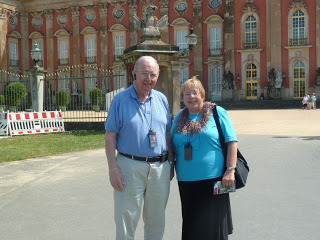 Vicky and Ed in Potsdam, at the Palace (one of many)
Vicky and Ed in Potsdam, at the Palace (one of many)Like Kristine’s hubby, mine is tolerant of my obsessions with all things English, and equally long-suffering when it comes to being dragged around to historic sites, stately homes, and even pet cemeteries. And a little like Kristine’s Greg, my Ed suffered a bit of a malady, if only some burst blisters. It was tough going for him by the end of our journey.
I will not go into detail on the entire trip, but to begin with, we had our first trip to Prague in the Czech Republic. The city is lovely and has a fascinating history. Perhaps my favorite spot was the Klementinum, part of a large complex once a monastery and church, now mostly a study center and concert venue.
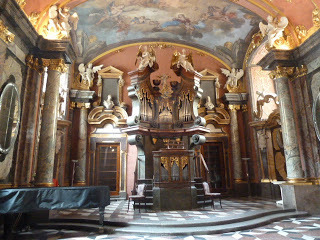 The Mirror Chapel I have to lift the photo below from the web, as they did not allow cameras near the library. It is a breath-taking sight and it made me yearn to study there. The guide said it is open to researchers...but I didn't see a soul.
The Mirror Chapel I have to lift the photo below from the web, as they did not allow cameras near the library. It is a breath-taking sight and it made me yearn to study there. The guide said it is open to researchers...but I didn't see a soul.
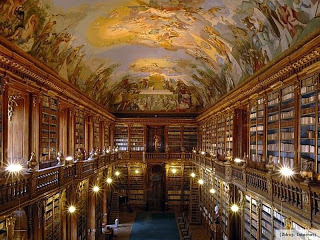 Klementinum Baroque Library Hall After a few days in Prague, we cruised the Elbe River on the MV Clara Schumann, part of the Viking Cruise Lines. A fabulous trip, with perfect weather, though we did see the traces of and some damage from the Central European floods of early June.
Klementinum Baroque Library Hall After a few days in Prague, we cruised the Elbe River on the MV Clara Schumann, part of the Viking Cruise Lines. A fabulous trip, with perfect weather, though we did see the traces of and some damage from the Central European floods of early June.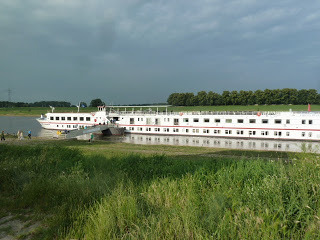 Clara Schumann We were surprised when one of our stops was to visit the beautiful scenic area of the Bohemian Mountains which straddle the Czech Republic/German border, called variously Bohemian Switzerland and Saxon Switzerland. I was completely taken by surprise at the two adjoining national parks. This dramatic scenery was much beloved by the early Romantics, including writers, poets, composers and artists from all over. Among the English visitors was Mary Godwin Shelley (1797-1851), of Frankenstein fame.
Clara Schumann We were surprised when one of our stops was to visit the beautiful scenic area of the Bohemian Mountains which straddle the Czech Republic/German border, called variously Bohemian Switzerland and Saxon Switzerland. I was completely taken by surprise at the two adjoining national parks. This dramatic scenery was much beloved by the early Romantics, including writers, poets, composers and artists from all over. Among the English visitors was Mary Godwin Shelley (1797-1851), of Frankenstein fame.
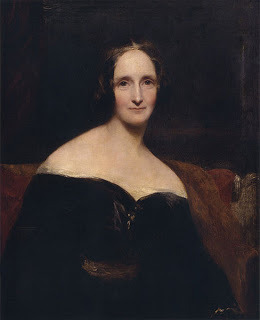 Mary Shelley by Richard Rothwell (1800-1868), NPG She wrote of the area in Rambles in Germany and Italy (1844): "Immediately on quitting the village the portals of the mountains opened before us, and we plunged into their recesses. It is difficult to describe the peculiarity of this region; it differs so much from every other...In Saxony, the impression is as if the tops of the hills were the outer circumference of the globe, strangely fissured and worn away by the action of water...The mystic imagination of the Germans has indeed peopled this region with gnome and kobold, who watch over hidden treasure..."
Mary Shelley by Richard Rothwell (1800-1868), NPG She wrote of the area in Rambles in Germany and Italy (1844): "Immediately on quitting the village the portals of the mountains opened before us, and we plunged into their recesses. It is difficult to describe the peculiarity of this region; it differs so much from every other...In Saxony, the impression is as if the tops of the hills were the outer circumference of the globe, strangely fissured and worn away by the action of water...The mystic imagination of the Germans has indeed peopled this region with gnome and kobold, who watch over hidden treasure..."
 "...The precipices are broken into a thousand fantastic shapes and forced into rough columns, pillars, and peaks numberless; with huge caverns, mighty portals, and towering archways; the whole clothed with pines, verdant with a luxuriant growth of various shrubs; and but that for the most part the long drought has silenced them, resonant with waterfalls."
"...The precipices are broken into a thousand fantastic shapes and forced into rough columns, pillars, and peaks numberless; with huge caverns, mighty portals, and towering archways; the whole clothed with pines, verdant with a luxuriant growth of various shrubs; and but that for the most part the long drought has silenced them, resonant with waterfalls."
 Another famous Romantic who visited the area was the English painter J. M. W. Turner. He sketched the scenery and his work is in the Tate Britain. Here is one example, viewing the river Elbe from above:.
Another famous Romantic who visited the area was the English painter J. M. W. Turner. He sketched the scenery and his work is in the Tate Britain. Here is one example, viewing the river Elbe from above:.
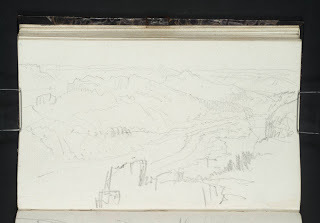
Below, two of my photos, from a similar vantage point.

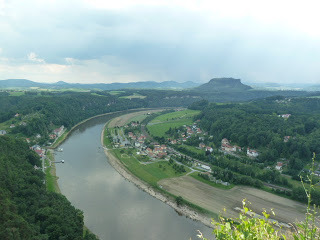
The well-known German artist of the sublime Casper David Friedrich (1774-1840) left us this atmospheric painting which also expresses the Romantic mood of the region.
 Wanderer Above the Sea of Fog, Kunsthalle Hamburg We next visited Dresden and had a few more British-related stops while in Germany. More about those to come soon. And also coming up, my busy (frantic?) week in England. Below, I wait for a break in the traffic to photograph Apsley House in London.
Wanderer Above the Sea of Fog, Kunsthalle Hamburg We next visited Dresden and had a few more British-related stops while in Germany. More about those to come soon. And also coming up, my busy (frantic?) week in England. Below, I wait for a break in the traffic to photograph Apsley House in London.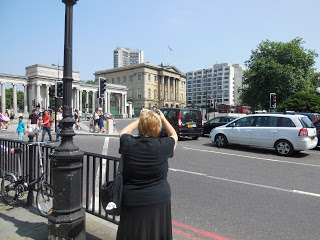
Published on August 09, 2013 00:00
August 7, 2013
At Auction - Christie's London
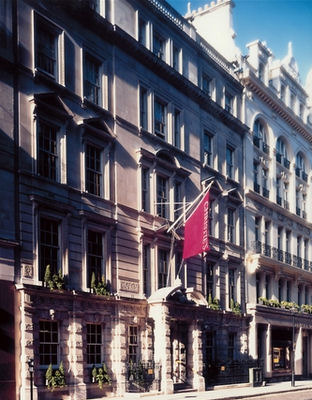
On July 2, Christie's London held an Old Masters & British Paintings Evening Sale. Here are the results for a few of the fabulous items that were on the block.
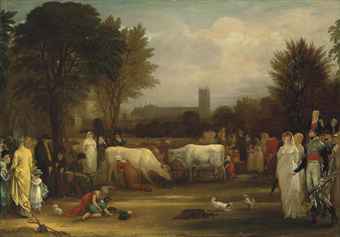 Benjamin West, P.R.A. (Springfield 1738-1820 London) Milkmaids in St James's Park, Westminster Abbey beyond Price Realized£217,875 ($331,388)
Benjamin West, P.R.A. (Springfield 1738-1820 London) Milkmaids in St James's Park, Westminster Abbey beyond Price Realized£217,875 ($331,388)
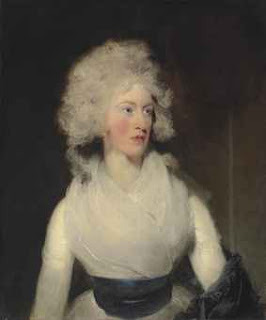 Sir Thomas Lawrence, P.R.A. (Bristol 1769-1830 London)Portrait of Emily, Lady Berkeley, half-length, in a white dress with a blue sash Price Realized£901,875 ($1,371,752)
Sir Thomas Lawrence, P.R.A. (Bristol 1769-1830 London)Portrait of Emily, Lady Berkeley, half-length, in a white dress with a blue sash Price Realized£901,875 ($1,371,752)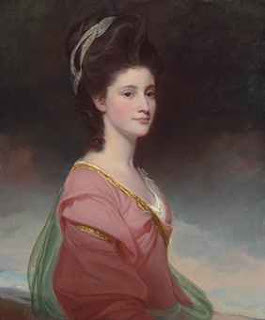
George Romney, R.A. (Dalton-in-Furness, Lancashire 1734-1802 Kendal, Cumbria) Portrait of Elizabeth Ramus (1751-1848), daughter of Nicholas Ramus and subsequently wife of Baron de NougalPrice Realized£541,875 ($824,192) Here are a few results Christie's The Exceptional Sale - July 4th
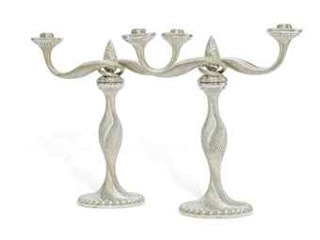 THE MARQUESS OF ANGLESEY'S CANDELABRA A PAIR OF GEORGE III SILVER TWO-LIGHT CANDELABRA MARK OF JOHN WAKELIN AND WILLIAM TAYLOR, LONDON, 1792 Price Realized£817,875 ($1,246,442)
THE MARQUESS OF ANGLESEY'S CANDELABRA A PAIR OF GEORGE III SILVER TWO-LIGHT CANDELABRA MARK OF JOHN WAKELIN AND WILLIAM TAYLOR, LONDON, 1792 Price Realized£817,875 ($1,246,442)
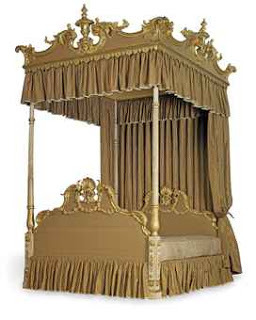 A GEORGE III CARVED GILTWOOD AND CREAM-PAINTED FOUR-POST BED CIRCA 1760 - 65, EXTENDED IN THE REGENCY. LORD CURZON'S FOUR-POST BED ACQUIRED FOR KEDLESTON HALLPrice Realized£109,875 ($167,450) And from the July 12 Cabinet of Curiosities Sale
A GEORGE III CARVED GILTWOOD AND CREAM-PAINTED FOUR-POST BED CIRCA 1760 - 65, EXTENDED IN THE REGENCY. LORD CURZON'S FOUR-POST BED ACQUIRED FOR KEDLESTON HALLPrice Realized£109,875 ($167,450) And from the July 12 Cabinet of Curiosities Sale
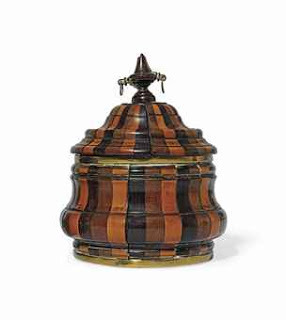 A DUTCH CARVED WOOD TOBACCO BOX CIRCA 1800 Price Realized£2,375 ($3,598)
A DUTCH CARVED WOOD TOBACCO BOX CIRCA 1800 Price Realized£2,375 ($3,598)And finally, from Bonham's, rather than Christie's
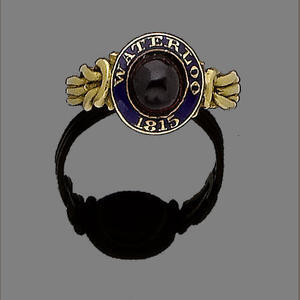 AAAaaaaarrrrgggghhhhhhh!
AAAaaaaarrrrgggghhhhhhh!Why didn't I know about this!? Je suis desolate.
The foiled cabochon garnet, within a blue enamel surround, inscribed 'Waterloo 1815', to reeded shoulders, in closed-back setting, mounted in gold, ring size MSold for £1,375 inc. premium
Published on August 07, 2013 00:00
August 5, 2013
A Couple In England: Day 9 - Part Two
Upon leaving Oatlands, Hester, Hubby and myself set off for Hampton Court Palace. I had never been before and therefore felt that I should rectify that. Now I'll come clean and tell you that I have relatively no interest in British history prior to roughly 1750. Henry VIII interests me not at all and anything earlier than that is off my historical radar. I have two great friends who write Scottish medieval romances - Sue Ellen Welfonder and the late Arnette Lamb. I've posed the same question to them both - why? What is remotely romantic about unwashed men with unkempt beards who wear skirts and sport dirt under their fingernails? Neither have ever given me a reason that satisfied.
Now don't get me wrong, in the typical course of things I'm up for visiting medieval, Tudor and Restoration sites, but I'm more interested in their history and occupants during the Georgian, Regency and Victorian eras. So when I went to Hampton Court Palace, my mission was to find Grace and Favour Apartment No. 9, where the Duke of Wellington's sister, Lady Anne, once lived. I mentioned this to Hester and Hubby when we arrived at the Palace.
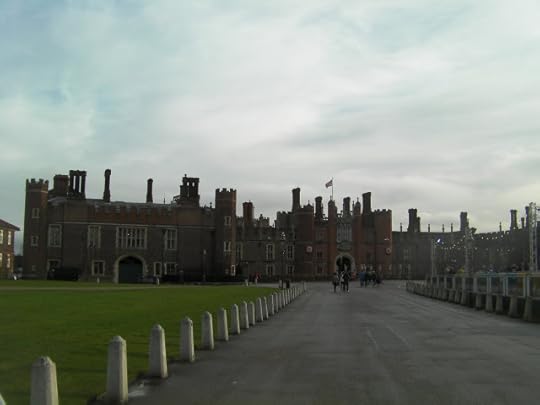
Hester said: "Well, we'll do our best to track it down. There must be someone here who knows where it is."
Hubby said: "Why?"
An ice skating rink had been set up near the entrance, so we stopped for a few minutes to watch the skaters.
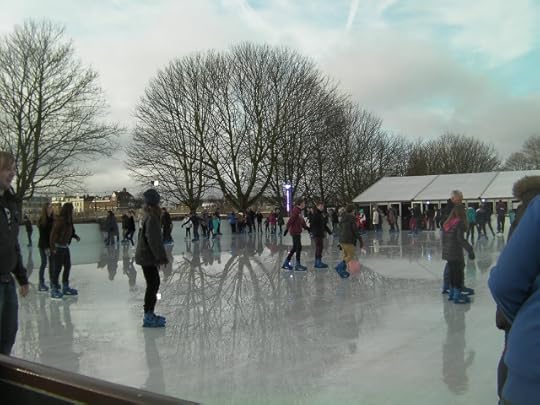
And then we passed over the moat on our way through the entrance.
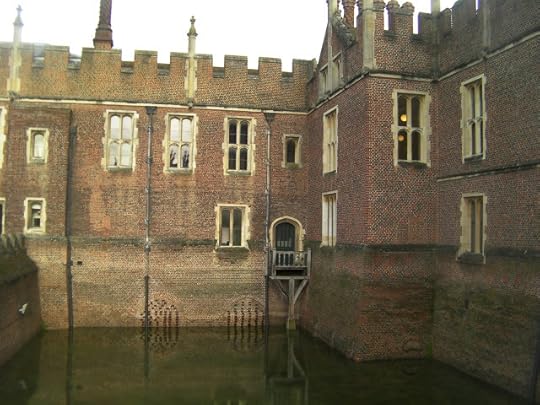
And found ourselves in a courtyard, where we couldn't help but notice the painted wooden figures scattered about. The one below seems to be napping.
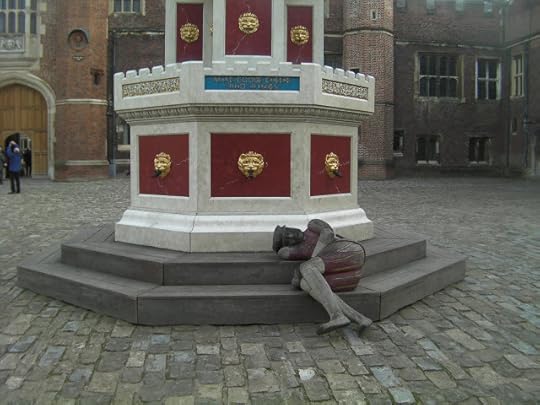
While this one looks to be hiding
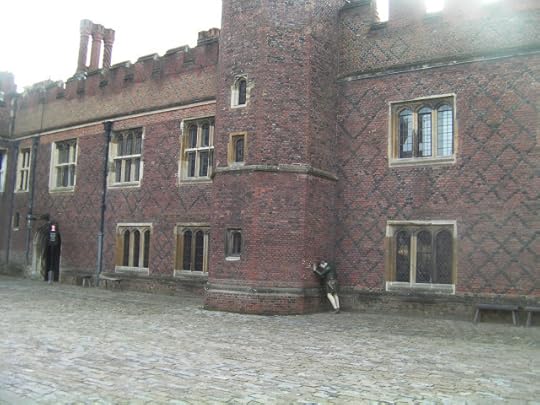
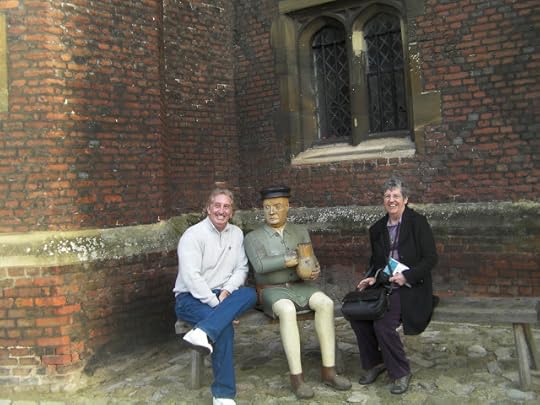
And the figure above made room for Hester and Hubby to sit beside him. Too bad there wasn't actually anything to drink in the jug he was holding. If you know the story behind these figures, do let me know. A Google search has turned up nothing so far.
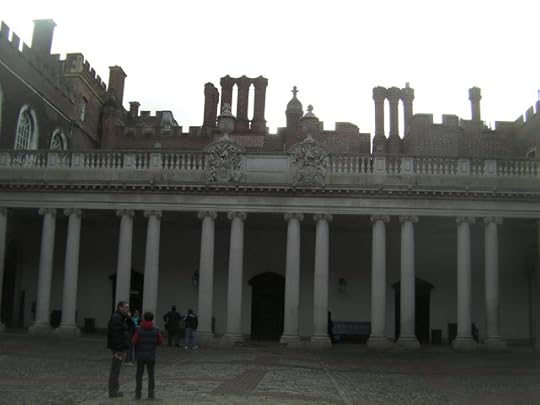
After taking note of the interesting chimney pots above, we crossed over the courtyard and into the visitor's centre, where we paid our entry fee and Hester asked the nice lady on duty if she knew the location of Apartment 9. She said she didn't, but that we should ask one of the Warders inside.
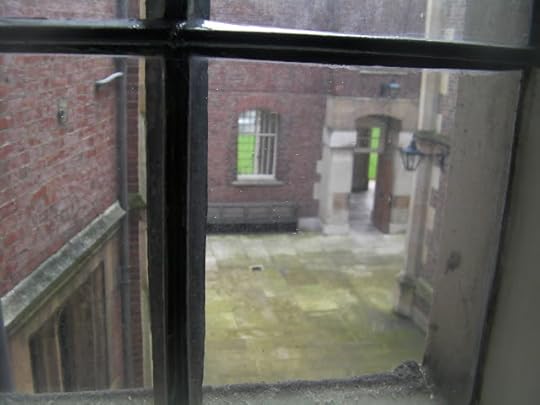
We traversed many a hallway and staircase and peeked out many a window before finding our first Warder. Upon Hester's asking him about Apartment 9, once home to the sister of the Duke of Wellington, this Warder said, "Ah, you'll be wanting Ian. He'll know. That's his time period. I believe he's in the Georgian Rooms."
We thanked him and moved on - before realizing that we hadn't asked where the Georgian Rooms are. So we traversed more halls and large, empty rooms.
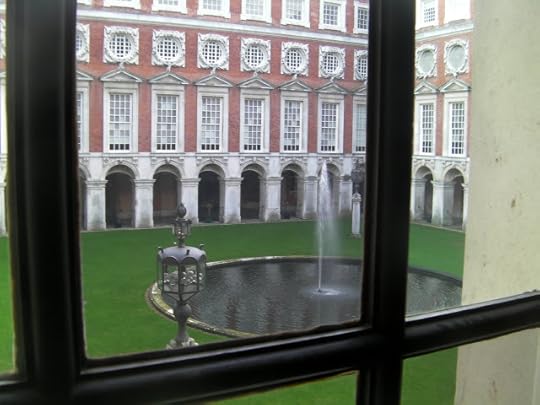
By this time, Hubby was decidedly fading.
"Oh, dear," said Hester, after getting a good look at his pale and clammy face. "Maybe you should sit down," she suggested.
"If there was a chair in sight, I'd take you up on that," Hubby replied. .
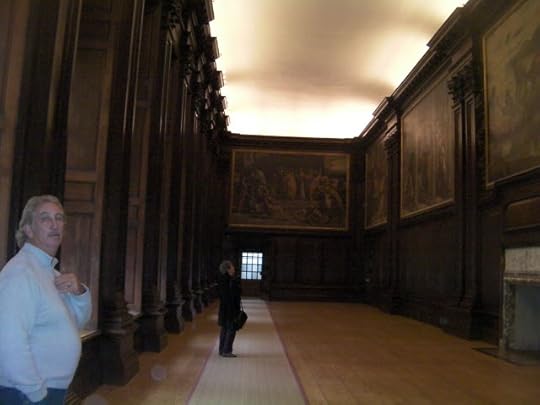
Finally, we found another Warder.
"Ian?" we all asked in hopeful unison.
"No, sorry. Ian's in the Georgian Rooms."
"You wouldn't know where Apartment 9 is, by any chance?"
"Apartment 9?"
"Yes, the grace and favour apartment where the Duke of Wellington's sister lived."
"Sorry. Ian's your man. He'll know. That's his time period."
We climbed up another set of stone stairs, with Hubby flagging behind us. Finally we arrived a room that actually had furniture in it. And a bed. I had to physically restrain Hubby from lying down upon it. And there was another Warder.
"Ian?" This one shook his head and pointed down a long and empty corridor. Sigh.
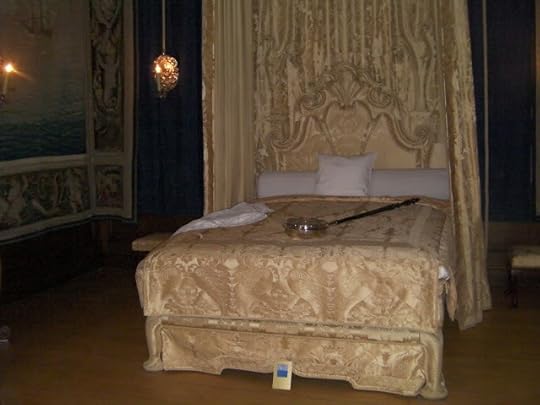
Down the hallway we all trudged until it opened into a panelled and painting lined room. In it stood another Warder.
"Ian?"
"Yes?"
Hester and I could have kissed him. Hubby collapsed onto a wide window ledge.
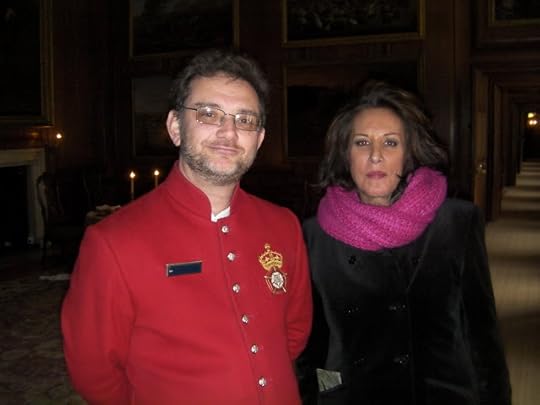
We told Ian all about our search for him and how we'd traipsed high and low searching for him, as we'd been told that he'd know all about the Duke of Wellington, Lady Anne and Apartment 9.
"Apartment 9? That's a new one on me. Lady Anne, you say?"
"Wellington's sister."
"I could look it up in the archives, of course, but that wouldn't do you much good today."
We exchanged email addresses and Ian, Hester and I began discussing the Regency and early Victorian history of Hampton Court. Turns out that Ian was, indeed, a font of knowledge. I can't tell you off hand all we discussed, but the conversation didn't flag for a moment and it went on for ages. After a while, I thought to check on Hubby.
Oh, dear. There he was, poor man, looking for all the world like something out the Night of the Living Dead and sitting patiently by whilst Hester and I jawed with Ian. As we turned to go, Ian said, "I'll email you about Apartment 9. But in the meantime perhaps you'd like to see where Wellington's mother lived?"
"Wellington's mother? Lady Mornington?"
"Yes," Ian nodded.
"Lived here, at Hampton Court?"
"Yes," Ian nodded. "Didn't you know?"
Apparently not.
So off we went, following a map that Ian was kind enough to draw for us.
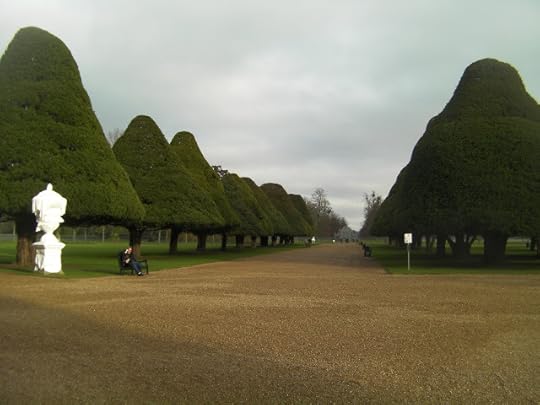
We walked the gravel paths and marveled at the sculpted trees until, miracle or miracles, we found the entrance to the apartment where Lady Mornington once lived, pictured below, exactly as described to us by Ian. Apparently, Lady Mornington kept a garden of some note behind these green gates. I contented myself with the fact that we'd at least found the spot and took pity upon Hubby by suggesting that we head back to Windsor, and our hotel room.
As we turned to go, I said to Hester, "Thank you for bringing us to see Hampton Court. And don't forget we've got the tour of the kitchens at Windsor Castle tomorrow."
"Oooh, I'm looking forward to that," she replied.
"Kitchens? A tour of kitchens? I don't have to go, do I?" asked Hubby.
"Well, I've got you a ticket."
"Hon, in case you haven't noticed, I'm dying here."
"And you've been such a good sport today," Hester encouraged him. Looking at me sideways, she continued, "Perhaps he'd be better off in bed."
"Well, of course you could stay in bed, but it's the royal kitchens. They aren't open all the time, you know, it's a special tour."
"I'll make the sacrifice."
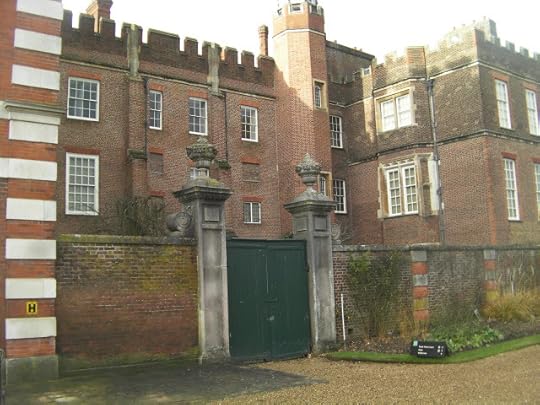
Published on August 05, 2013 00:00
Kristine Hughes's Blog
- Kristine Hughes's profile
- 6 followers
Kristine Hughes isn't a Goodreads Author
(yet),
but they
do have a blog,
so here are some recent posts imported from
their feed.



